THE ANNUAL REPORT 2023

he Mindich Child Health and Development Institute (MCHDI) is a translational research enterprise with the mission of advancing knowledge and therapies for diseases affecting infants, children, and adolescents. Led by Bruce D. Gelb, MD, the MCHDI provides an intellectually rich and supportive environment for fostering collaborative scientific investigation and Mount Sinai’s “bench to bedside” philosophy, as well as training the next generation of scientific leaders in pediatric medicine.
Physician-scientists and scientists at the MCHDI work in a multidisciplinary manner with researchers and physicians in various departments and institutes at Mount Sinai. Together, we strive toward the objectives of developing robust paradigms for understanding the effects of genetics and environment on the health of infants, children, and adolescents and personalizing pediatric medicine through genetics and genomics.
The Mindich Child Health and Development Institute 2

The Mindich Child Health and Development Institute 3 TABLE OF CONTENTS Director’s Message 4 Faculty Growth ....................................................................................................................................... 5 New Faculty 6 Annual Retreat ........................................................................................................................................ 13 Faculty Research Areas 14 Faculty Research Interactions ...................................................................................................... 29 Awards/Honors and Publications 33 Grants and Outgoing Material Transfer Agreements/Licenses ................................. 40 Pilot Projects Funded for 2023 42 Communications ................................................................................................................................... 45 Shared Resources 46 Pediatric Clinical Trials Office ........................................................................................................ 48 Pediatric Precision Medicine 52 Center for Child Health Services Research ........................................................................... 53 Leadership and Staff 55
Director’s Message
 Bruce D. Gelb, MD, Director
Bruce D. Gelb, MD, Director
In 2023, the MCHDI enjoyed an outstanding year. With the COVID-19 pandemic definitely in the rearview mirror, our in-person activities were very much back to normal. As one example, we felt comfortable inviting a family with a child whose care had been impacted through research to our annual retreat in November, something not possible the year before. That said, it sure feels like some things have changed. We are all videoconferencing savvy (okay, I admit to still forgetting to come off mute when starting to speak sometimes), which has improved our communications for the most part. On the other hand, the return to pre-pandemic levels of in-person interactiveness, particularly among trainees, remains a work in progress. Let’s all commit to find more ways to support one another in 2024.
Speaking of connectivity: I noted during my remarks at the 2023 MCHDI annual retreat that 2024—and probably a couple of years beyond—was shaping up to be quite challenging with respect to NIH grant funding. I never imagined that we would still not have an approved fiscal year 2024 budget for NIH when writing these thoughts in Q1 of 2024. But here we are. The current handicapping is that we will be fortunate if NIH’s budget is flat relative to last year, but a cut of 0.5 percent or 1 percent is more likely. Given that, we can anticipate that the paylines at the various NIH institutes will be dropping and award sizes will be reduced. While those prospects are unquestionably concerning, we are fortunate to have constructive steps that can mitigate them. Those steps largely depend on our connectivity: our collaborativeness within the MCHDI, and at Mount Sinai more broadly, will cushion us.
I strongly encourage all MCHDI investigators to leverage our Incubator Series and our grant specific aims reviewer program. I have used both programs for my NIH grant applications, consistently receiving useful critical feedback. I am positive that my R01 application from last June would not have achieved a fundable score without that input. Other MCHDI faculty have similar stories. I also hope that all of us will give generously of our time to one another: attending Incubator Series sessions and reviewing others’ specific aims take up time, which is a precious commodity. Still, we can derive joy and pride from helping one another (and, yes, we often learn something about grant strategies).
Based on input from the MCHDI Internal Advisory Board, we will be rolling out a new program, hoping to provide additional support for grant applications. We are finishing the fine details, but, in essence, we will be funding MCHDI investigators to work with professional grant writers in order to polish their research strategies. This will require that those documents are developed sufficiently in advance of the relevant submission deadline in order to permit the writers to work their magic. Having never tried this approach, the MCHDI will be monitoring the application success rate to determine if the return on investment with respect to success rates relative to cost makes sense. We have good reason to believe it will.
I look forward to working closely with all of you this year. We should all be proud of the interactive culture that we have built together over the years. Now is the time for us to all dig a bit deeper to further enable our amazing child health-related science to garner the level of extramural support needed to advance our collective mission.
The Mindich Child Health and Development Institute 4
FACULTY GROWTH
MCHDI ANNUAL FACULTY GROWTH 2023
In 2023
We welcomed three new external faculty and 10 internal faculty members to our institute.
97 Members
In 2023, we welcomed three new external faculty and 10 internal faculty members to our institute. Currently, we total 97 members consisting of scientists and physician-scientists across the disciplines of Allergy & Asthma, Cardiovascular Disease, Neurodevelopmental Disorders, Obesity & Diabetes, and more.
n Existing faculty
n Internal recruits
n External recruits
The Mindich Child Health and Development Institute 5
Chart of faculty recruits since our inception in 2009. In 2023, our institute recruited three new external and 10 new internal faculty members to our institute.

NEW FACULTY
The Mindich Child Health and Development Institute 6
NEW EXTRAMURAL FACULTY
Brett R. Anderson, MD, MBA, MS
Brett R. Anderson, MD, MBA, MS, joins Mount Sinai as the inaugural Director for the Center for Child Health Services Research in the Mindich Child Health and Development Institute at the Icahn School of Medicine at Mount Sinai. Dr. Anderson is a pediatric cardiologist, Associate Professor in the Departments of Pediatrics, and Population Health and Policy, and an NIH-funded health services and health equity researcher.
Dr. Anderson completed her general pediatrics residency at The Children’s Hospital of Philadelphia and fellowship in pediatric cardiology at NewYork-Presbyterian/Morgan Stanley Children’s Hospital. She joins us after a decade at Columbia University, where she served as Director of Clinical Research, Outcomes, and Quality for the Pediatric Heart Center and Co-Director of ASPIRE! Peer Mentoring. Her significant contributions and leadership in the field are exemplified by her commitment to advancing pediatric cardiology and health services research.
Dr. Anderson brings a wealth of knowledge, employing an interdisciplinary approach that combines her medical,
business, and statistical expertise. Her focus is on identifying modifiable drivers of outcomes, value, and health inequities, with a particular emphasis on children with cardiac disease. She is the founder and Director of the New York State Congenital Heart Surgery Collaborative for Longitudinal Outcomes and Utilization of Resources (CHS-COLOUR), leading an interdisciplinary collaborative that examines the etiologies of health inequities and plans for programmatic interventions. Additionally, Dr. Anderson serves as M-PI for the Pediatric Heart Network New York Consortium (PHN-NYC), a vital part of the NHLBI-funded pediatric cardiac clinical trials network.
Romina Bevacqua, PhD
Romina Bevacqua, PhD, has been a new Assistant Professor in the Department of Medicine, Division of Endocrinology, Diabetes, and Bone Disease, and member of the Diabetes, Obesity and Metabolism Institute (DOMI) and the Regenerative Biology and Stem Cell Institute, at Mount Sinai, since January 2023 where she was selected as a Biomedical Laureate.
Previously, Dr. Bevacqua was an Instructor (2020-2021) and a postdoctoral fellow (2017-2020) in the laboratory of Professor Seung Kim, Department of Developmental Biology, at the Stanford University School of Medicine. Dr. Bevacqua’s graduate studies where completed in Buenos Aires University, Argentina.
The Bevacqua Lab focuses on understanding the regulatory mechanisms governing pancreatic islet cell function and maturation, and integrates modern genetic, cell, and developmental biology, biochemical, and physiological approaches. In particular, Dr. Bevacqua’s development of genetic systems, including CRISPR/Cas9, in primary human islet organoids, termed “pseudoislets,” provides unprecedented methods to investigate mechanisms reg-
ulating function of mature human islets. Using these novel systems, the lab is interested in understanding how transcriptional regulators, non-coding regulatory elements, and epigenetic and external signals orchestrate crucial steps in human islet functional maturation and proliferation, and how these steps are mis-regulated in human diseases, particularly type 1 (T1D) and type 2 diabetes (T2D). The goal of the Lab is to advance and deepen the fundamental understanding of islet regulation and function, and their connection to complex traits associated with diseases, particularly T1D and T2D, knowledge that should inform islet replacement and regeneration therapies. For more info, please refer to the Bevacqua Lab at https://labs.icahn.mssm.edu/bevacqualab/.
The Mindich Child Health and Development Institute 7
NEW EXTRAMURAL FACULTY - CONTINUED
Georgia Panagiotakos, PhD
Georgia Panagiotakos, PhD, is an Associate Professor of Psychiatry, and Neuroscience at the Icahn School of Medicine at Mount Sinai. She is also a member of the Seaver Autism Center for Research and Treatment, the Alper Center for Neural Development and Regeneration, the Institute for Regenerative Medicine, and the Friedman Brain Institute.
Prior to her arrival at Mount Sinai, Dr. Panagiotakos launched her independent research program as a Sandler Faculty Fellow at the University of California, San Francisco, after earning her PhD from the Stanford University School of Medicine Neurosciences Doctoral Program. The central focus of the Panagiotakos laboratory is to dissect the cellular and molecular mechanisms underlying mammalian brain development, with an eye towards uncovering the underpinnings of neuropsychiatric disorders of developmental origin. We are especially interested in understanding how electrical activity, calcium signaling, and ion channel diver-
sity regulate developmental transitions and the generation of distinct cell types in the developing brain. To investigate this, we incorporate multiple levels of analysis and a variety of orthogonal in vivo and in vitro approaches, including genetic tools in mouse models, live imaging and sequencing technologies. In the longer term, we also aim to shed light on how activity-regulated developmental mechanisms may be reactivated in the context of adult neurological disorders and the development of brain tumors.
NEW INTRAMURAL FACULTY

Sandeep Gangadharan, MD
Sandeep Gangadharan, MD, is an Associate Professor of Pediatrics. His primary academic interest is in performance improvement of acute clinical care systems, whether through in situ simulation, clinical informatics, or process and implementation science.
As a member of the Improving Pediatric Acute Care Through Simulation (ImPACTS) study group, Dr. Gangadharan has been centrally involved in demonstrating both the utility of medical simulation as a diagnostic tool for evaluating complex clinical processes, such as acute resuscitation, and its ability to determine important clinical metrics that assess the quality of care. In addition to Dr. Gangadharan’s interest in medical simulation, he has initiated, designed, and completed several clinical and quality research projects relevant to his field. The broader theme of many of these projects is evaluating and potentially enhancing the quality of procedural and resuscitation care in pediatric intensive care medicine utilizing multi-institutional databases. Dr. Gangad-
haran continues to be interested in similar work that seeks to evaluate the process of care, whether by simulation, data analytics, EMR optimization, or clinical informatics, to find areas of opportunity to make care more safe, efficient, and effective for children. Finally, Dr. Gangadharan continues to be an active member of the Pedi-Res-Q, Near-4-Kids, and Get with Guidelines collaborative efforts to study and improve resuscitative care in children. Currently, Dr. Gangadharan’s focus is on clinical informatics and machine learning to develop effective clinical decision support tools and improve the process of acute care and cardiopulmonary resuscitation.
The Mindich Child Health and Development Institute 8
NEW INTRAMURAL FACULTY -
Yolanda Garcia-Carmona, PhD
Yolanda Garcia-Carmona, PhD, is an Instructor at the Department of Medicine in the Division of Clinical Immunology at the Icahn School of Medicine at Mount Sinai. Dr. Garcia-Carmona received her PhD in 2011 in cellular and molecular biology at Autonomous University of Madrid (Spain), where she studied the crosstalk between B cells and synovial fibroblasts in the perpetuation of the inflammation in rheumatoid arthritis patients.
In 2011, she joined Dr. Charlotte Cunningham-Rundles’ laboratory and the Immunology Institute at the Icahn School of Medicine at Mount Sinai, where she completed her postdoctoral training and was promoted to Instructor in 2017. One of her main interests is to study human B cell defects to better understand B cell biology. Working to decipher some of the genes involved in CVID, 36 percent of the United States monogenic cohort had mutations in transmembrane activator and CAML interactor (TACI). Unlike the murine TACI gene, the human TACI gene under-
Dirk Hubmacher, PhD
goes alternative splicing, to produce two isoforms (TACI-L and TACI-S), both of which are found in human B cells. When comparing functions only the TACI-S isoform, together with endogenous APRIL, sponsors the plasma cell genetic program.
Dr. Garcia-Carmona’s research also involves a more benchto-bedside approach, focusing on identifying new therapeutic targets and developing more efficient strategies to neutralize B cells in autoimmunity and B cell malignancies.
Dirk Hubmacher, PhD, is an Assistant Professor in the Department of Orthopedics, where his team investigates the role of extracellular matrix proteases, ADAMTS-like proteins, and fibrillins in the context of developmental short stature syndromes. Dr. Hubmacher received his PhD from the University of Lübeck (Germany) in 2004 where he studied iron uptake in salt-loving archaea.
He entered the field of connective tissue disorders as a postdoctoral fellow with Dr. Dieter Reinhardt (McGill University, Montreal) where he studied molecular pathomechanisms underlying Marfan syndrome and homocystinuria. In 2011, Dr. Hubmacher joined the laboratory of Dr. Suneel Apte at the Cleveland Clinic to study the function of ADAMTS proteases and ADAMTS-like proteins in mouse models of rare developmental short stature syndromes. In 2018, he moved to the Icahn School of Medicine, where his team continues to investigate pathomechanisms of these syndromes with a focus on geleophysic dysplasia, Weill-Marchesani syn-
drome, and Marfan syndrome. Dr. Hubmacher has received funding from the NIH/NIAMS, the Marfan Foundation, the Ines Mandl Research Foundation, and the German Academic Exchange Service. His work was recognized by the Harold and Golden Lamport Clinical Research Award (2021), the Mount Sinai Faculty Idea Prize (2019), and the Young Investigator Award from the Marfan Foundation (2005). Dr. Hubmacher served as an ad hoc reviewer on several NIH study sections and DoD review panels and served as an elected council member for the American Society for Matrix Biology (2018-2022).
The Mindich Child Health and Development Institute 9
CONTINUED
INTRAMURAL FACULTY -
CONTINUED

Esra Karakose, PhD
Esra Karakose, PhD, is an Assistant Professor in the Department of Medicine. The main focus of her research is to understand the genetic and epigenetic mechanisms that govern human pancreatic beta cell replication, with the aim of developing new therapies for diabetes. Since diabetes results from the lack of sufficient numbers of insulin-producing beta cells, one measure to reverse diabetes is to restore normal beta cell mass and function.
To this end, her group studies insulinoma, a benign pancreatic tumor that consists of beta cells. In their study, they found that epigenetics is important for the regulation of human beta cell replication. They also identified several novel pathways that induce proliferation in beta cells from normal human organ donors.
In a recent study, they demonstrated that TGF beta and DYRK1A signaling synergize to induce unprecedented rates of human beta cell proliferation. They uncovered that TGF beta signaling works in collaboration with Trithorax complex, which is an essential component of epigenetic regulation. Thus, their results indicated an unequivocal role for epigenetics in human beta cell replication. Further, in a more recent study, they showed that GLP1R agonists also
Liora S. Katz, PhD
synergize with DYRK1A signaling to induce robust levels of beta cell proliferation.
In addition to these approaches, they recently started using single cell approaches to better understand the mechanisms that control beta cell replication. In this study, the researchers analyzed the transcriptome of cadaveric human islets treated with beta cell regenerative drugs using single-cell RNA-seq. Their results revealed that the lineage dynamics in the human islets are more sophisticated than initially anticipated when islets are subject to regenerative drugs. Importantly, they showed that cycling alpha cells are the main target of regenerative drug treatment in human islets, and they have the potential to transdifferentiate into human beta cells.
Liora S. Katz, PhD, is an Associate Professor at the Diabetes, Obesity and Metabolism Institute, and of the Mindich Child Health and Development Institute. Dr. Katz is a beta cell biology expert. Her research spans the fields of endocrinology, thyroid dysfunction, and diabetes.
Among her notable research, she investigated the transcriptional pathways governing alpha and beta cell development, focusing on the role of Pax6. Furthermore, she has delved into cell replacement therapies for diabetes treatment, establishing a pioneering protocol for reprogramming human dermal fibroblasts into islet-like cells through a combination of epigenetic modifications and transcription factor modulation. Dr. Katz has also explored the dysregulation of proliferation in pancreatic cancer. In her recent work, Dr. Katz has placed a specific emphasis on glucose-induced adaptive expansion and the mechanisms governing beta cell failure in the context of metabolic overload. Notably, her
work has shed light on the pivotal roles of ChREBP, Myc, and Nrf2 in regulating beta cell proliferation and function. Dr. Katz’s research has extended to uncovering maladaptive feedback loops associated with glucotoxic beta cell failure, offering insights into genetic and pharmacological mechanisms aimed at preventing beta cell loss—an important unmet need in diabetes research. Overall, Dr. Katz’s impactful research significantly advances our understanding of the molecular pathways involved in glucose-mediated adaptive responses and the various factors influencing both the health and dysfunction of beta cells.
The Mindich Child Health and Development Institute 10
INTRAMURAL FACULTY - CONTINUED

Corina Lesseur, MD, PhD
Corina Lesseur, MD, PhD, is an Assistant Professor in the Department of Environmental Medicine and Public Health. Dr. Lesseur received her MD at the Central University of Venezuela and a PhD in molecular and experimental medicine from Dartmouth College. She completed a postdoctoral fellowship in genetic epidemiology at the International Agency for Research in Cancer, followed by postdoctoral training in environmental health and molecular epidemiology at the Icahn School of Medicine at Mount Sinai.
Her work as a molecular epidemiologist focuses on placental epi/genomics and their link to pregnancy outcomes and early-life programming, as well as in the effects of environmental exposures (i.e., air pollution, pesticides) in the placenta and birth outcomes. She is particularly interested in maternal and infant metabolic outcomes (birth weight,
obesity, and gestational diabetes). Dr. Lesseur has worked in multiple birth cohort studies evaluating placental epi/genetic features in relation to maternal and infant health, and environmental exposures. Dr. Lesseur has received funding from the NIH/NICHD, the March of Dimes and the Marie Curie COFUND.

Alejandro Martin-Trujillo, PhD
Alejandro Martin-Trujillo, PhD, is an Assistant Professor in the Department of genetics and Genomic Sciences within the team of Dr. Andrew J. Sharp. After earning his MSc in genetics and development, he completed his PhD in biomedicine at the University of Barcelona (Spain) in 2014.
During his PhD, Dr. Martin-Trujillo characterized the extent of parent-of-origin DNA methylation in the human genome, identifying novel imprinted regions and, thus, helping to define the human imprintome. Subsequently, he investigated the deregulation of these loci in a wide range of human diseases, including the well-known imprinting disorders as well as several types of cancer. He then joined the laboratory of Dr. Sharp as a postdoctoral fellow, where his research expanded to explore epigenetic variation beyond imprinted loci as well as genetic variation at complex genomic regions
that often eludes standard genetic studies. His current research primarily focuses on profiling both common and rare variation at tandem repeats (TR) from whole exome and genome sequencing data using sophisticated computational approaches on a large scale. These studies aim to identify TR variation implicated in the regulation of the genome function, phenotypic diversity, and human diseases ranging from congenital anomalies to late-onset neurodegenerative disorders.
The Mindich Child Health and Development Institute 11
INTRAMURAL FACULTY - CONTINUED
Nicole Ramsey, MD, PhD
Nicole Ramsey, MD, PhD, is an Assistant Professor of Pediatrics in the Division of Pediatric Allergy and Immunology in the Jack and Lucy Clark Department of Pediatrics at the Icahn School of Medicine at Mount Sinai and Mount Sinai Kravis Children’s Hospital.
Dr. Ramsey is a clinician and pediatrician-scientist who earned her BS magna cum laude from Howard University, an MD from Weill Cornell Medical College, and a PhD in biophysics and pharmacology from Weill Cornell Graduate School of Biomedical Sciences. She completed her pediatric residency in the Pediatrician-Scientist Training and Development Program at Baylor College of Medicine/ Texas Children’s Hospital, and her allergy/immunology fellowship at Icahn School of Medicine at Mount Sinai. Through all of her work, Dr. Ramsey hopes to improve the availability of safe and effective medications for children.
Dr. Ramsey’s research interests include food allergy treatment mechanisms (including basophil activation, allergen-specific T cell responses, proteomics, and tran-
Anna Rommel, PhD
scriptomics), the development of new treatment modalities, exposomics, and the impact of prenatal environmental exposures on the risk of developing food allergy. She is helping to lead a clinical trial to determine the effect of an oral selective JAK inhibitor on food allergy in adult patients who have a history of eczema. Dr. Ramsey is also interested in health equity and is working on qualitative research to help improve clinical trial diversity in pediatric food allergy with focus groups and surveys.
Dr. Ramsey’s areas of clinical expertise include food allergy, atopic dermatitis/eczema, allergic rhinitis, urticaria, anaphylaxis, and allergy testing.
Anna Rommel, PhD, is an Assistant Professor in the Department of Psychiatry. Her work as a psychiatric epidemiologist focuses on environmental exposures and their link to the development of adverse health outcomes, including suboptimal pregnancy and birth outcomes, as well as adverse neurodevelopment and longer-term psychopathology.
Dr. Rommel is also interested in mental illness related to reproductive events, including pregnancy and menopause. She has been instrumental in setting up two separate birth cohorts and has conducted analyses in several existing birth cohorts to study the outcomes of early life exposure to, for example, maternal mental illness, medication, phthalates, and inflammation. Her lab applies epidemiological,
genetically sensitive, and cognitive-neurophysiological (EGG) designs to study the relationship between parental and early-life factors with long-term (neuro)developmental outcomes, and the biological mechanisms underlying it. Dr. Rommel’s overarching goal is the identification of modifiable risk and resilience factors, and the resulting improvement of prevention and treatment of adverse health outcomes.
The Mindich Child Health and Development Institute 12
INTRAMURAL FACULTY - CONTINUED

Caterina Tiozzo, MD, PhD
Caterina Tiozzo, MD, PhD, is an Associate Professor of Newborn Medicine at the Icahn School of Medicine at Mount Sinai. Dr. Tiozzo received her medical degree cum laude from the University of Padova where she also completed her first pediatric residency, neonatal fellowship, and Master of Public Health with humanitarian missions in Kenya. She then pursued her PhD through a collaboration between the University of Padova and the University of Southern California in Los Angeles.
After her humanitarian mission in Haiti during the 2010 earthquake, she decided to go back to clinical training to be able to practice in the United States so she completed her second pediatric residency and her neonatal fellowship at Columbia University. She trained and mentored many neonatal trainees over her career, both in Italy and in the United States.
She is a member of the “Society of Pediatric Research” and she is the recipient of several awards for her research discoveries from Europe and the United States.
She was selected by the Italian government for a documentary on Italians in New York during COVID and she received the title of Knight of the “Order of Croce d’Italia” by the Italian president for her work.
Dr. Tiozzo’s research focuses on lung development, stem cell regeneration after lung injury, the role of the intrauterine environment in lung development, and the effect of neonatal nutrition on lung development. She is the author of more than 30 papers and is often invited to speak at national and international meetings on the topic of her research interests.
ANNUAL RETREAT
The 11th annual retreat took place at the Harmonie Club on November 28, 2023, gathering nearly 130 participants, including faculty, trainees, staff, and volunteers. The retreat planning committee, spearheaded by Committee Chair Florence Marlow, PhD, and composed of our MCHDI Director Bruce D. Gelb, MD, and MCHDI faculty members Tirtha K. Das, PhD, Sharon Baumel-Alterzon, PhD, and Trainee Leadership Committee Chair Lauren Dierdoff, BS, worked diligently to orchestrate the event. Mustafa Khokha, MD, a distinguished Professor in the Departments of Pediatrics, Genetics, and Obstetrics, Gynecology, and Reproductive Sciences at Yale University School of Medicine, served as the keynote speaker and panelist.” His keynote talk was titled “Mitochondrial Metabolism Establishes the Spemann-Mangold Organizer: Discovery From Patients With Leigh Syndrome.” During the enlightening panel session
titled “Science and Social Responsibility: Outreach Opportunities and Perspectives Across Academia,” experienced panelists Alexander Joseph, MA, Sarah E. Millar, PhD, and Shelby Smout, PhD, shared their perspectives, and their valuable insights enriched our event.
The event also featured recognition for outstanding achievements, including the awarding of Young Investigators Competition (YIC) winners Clifford Liu, MS (PI: Bruce D. Gelb, MD), and Miranda L. Wilson (PI: Florence Marlow, PhD). Congratulations were extended to recipients of the best poster awards: Macy Akalu (PI: Dusan Bogunovic, PhD), Paloma Bravo, MS (PI: Florence Marlow, PhD), Ivianis Nieves Carril (PI: Nicole C. Dubois, PhD), Alexa von Mueffling (PI: Silvia De Rubeis, PhD), and Shrey Patel (PI: Bruce D. Gelb, MD).
The Mindich Child Health and Development Institute 13

FACULTY RESEARCH AREAS
The Mindich Child Health and Development Institute 14
ASTHMA AND ALLERGY





M. Cecilia Berin, PhD (Adjunct Professor, Pediatrics)
Research Areas: Immune mechanisms of food allergy and regulation of immune tolerance
Supinda Bunyavanich, MD, MPH, MPhil (Professor, Pediatrics, and Genetics and Genomic Sciences)
Research Areas: Systems biology and integrative omics of asthma and allergic diseases
Maria Curotto de Lafaille, PhD
(Professor, Pediatrics, and Immunology and Immunotherapy)
Research Areas: Immunology of allergic diseases, B lymphocyte responses
Nicole Ramsey, MD, PhD (Instructor, Pediatrics)
Research Areas: Environmental exposures and food allergy risk, food allergy treatment mechanisms, health equity in pediatric clinical trial recruitment/enrollment/retention
Ke Hao, ScD
(Professor, Genetics and Genomic Sciences)
Research Areas: Genetic pleiotropy, mendelian randomization, inflammatory bowel disease, placenta biology, ambient air particulate matter exposure
Hugh A. Sampson, MD
(Kurt Hirschhorn Professor, Pediatrics)
Research Areas: Immunopathogenesis of food allergy and anaphylaxis
Scott H. Sicherer, MD
(Director, Jaffe Food Allergy Institute; Division Chief, Pediatric Allergy; Elliot Roslyn Jaffe Professor, Pediatrics)
Research Areas: Food allergy epidemiology, treatments, natural course, quality of life
The Mindich Child Health and Development Institute 15
ASTHMA AND ALLERGY - CONTINUED

Julie Wang, MD
(Professor, Pediatrics)
Research Areas: Novel therapeutics for food allergy, epidemiology and management of food allergy and anaphylaxis
Karen M. Wilson, MD, MPH
(Adjunct Professor, Pediatrics)
Research Areas: Secondhand tobacco smoke, secondhand marijuana smoke, inpatient respiratory illness
CARDIOVASCULAR DISEASE

Harold S. Bernstein, MD, PhD
(Adjunct Professor, Pediatrics)
Research Areas: Drug development (target validation through clinical proof of concept), heart failure, metabolic syndrome, diabetes, thrombosis, chronic kidney disease
Nicole C. Dubois, PhD
(Associate Professor, Cell, Developmental & Regenerative Biology)
Research Areas: Heart development, stem cell differentiation, disease modeling
Son Duong, MD
(Assistant Professor, Pediatrics)
Research Areas: Artificial intelligence in cardiac imaging, pediatric cardiology
Bruce D. Gelb, MD
(Dean of Child Health Research, Gogel Family Professor and Director, The Mindich Child Health and Development Institute; Professor, Pediatrics, and Genetics and Genomic Sciences)
Research Areas: Genetics of cardiovascular diseases, stem cell research, pediatric precision medicine
Alan Groves, MBChB, MD
(Adjunct Professor, Diagnostic, Molecular and Interventional Radiology)
Research Areas: Hemodynamics, cardiac function, echocardiography, magnetic resonance imaging
The Mindich Child Health and Development Institute 16
CARDIOVASCULAR DISEASE - CONTINUED


Yuval Itan, PhD
(Associate Professor, Genetics and Genomic Sciences)
Research Areas: Human disease genomics, computational biology, and bioinformatics
Anne Moon, MD, PhD
(Adjunct Professor, Pediatrics)
Research Areas: Developmental biology of congenital heart disease and limb defects, functions of Tbx and fibroblast growth factors
Amy R. Kontorovich, MD, PhD
(Medical Director, Adult Cardiovascular Genetics; Associate Professor, Medicine)
Research Areas: Myocarditis, genetics of cardiovascular diseases, stem cell research
NEURODEVELOPMENTAL DISORDERS



Mafalda Barbosa, MD, PhD
(Assistant Professor, Genetics and Genomic Sciences)
Research Areas: Genetics of neurodevelopmental disorders, precision medicine, rare diseases
Jennifer Bragg, MD
(Associate Professor, Pediatrics)
Research Areas: Neurodevelopmental disorders, sensory processing disorders, impact of parental stress on neurodevelopment, developmental programming, neurodevelopment in children with congenital heart disease, whole genome sequencing in infants and neonates
Michael S. Breen, PhD
(Assistant Professor, Psychiatry, and Genetics and Genomic Sciences)
Research Areas: Functional genomics of neurodevelopmental and neuropsychiatric disorders, transcriptomics, single-cell RNA-sequencing, stem cells, RNA editing and biology
Joseph D. Buxbaum, PhD
(Deputy Chair, Department of Psychiatry; Director, Seaver Autism Center for Research and Treatment; Professor, Psychiatry, Neuroscience, and Genetics and Genomic Sciences)
Research Areas: Autism spectrum disorder, neurodevelopmental disorders, gene discovery, functional genetics, molecular and cellular neuroscience, cell and animal model systems
The Mindich Child Health and Development Institute 17
NEURODEVELOPMENTAL DISORDERS - CONTINUED




Jia Chen, ScD
(Professor, Pediatrics, Environmental Medicine & Public Health, Medicine, and Oncological Sciences)
Research Areas: Environmental epigenetics, molecular epidemiology
Tirtha K. Das, PhD
(Assistant Professor, Cell, Developmental & Regenerative Biology)
Research Areas: Integrating fly plus vertebrate disease models, cancer, rare mendelian diseases, therapeutics development
Silvia De Rubeis, PhD
(Associate Professor, Psychiatry)
Research Areas: Intellectual disability, autism spectrum disorder, functional genetics, cell and animal model systems, brain development
Jennifer Foss-Feig, PhD
(Associate Professor, Psychiatry)
Research Areas: Autism spectrum and related neurodevelopmental disorders, neuroimaging, interactive social neuroscience, biomarker discovery, sensory processing
Dorothy E. Grice, MD
(Professor, Psychiatry)
Research Areas: Genetic and epidemiological studies of OCD, Tourette’s disorder, autism, and related childhood-onset neuropsychiatric disorders, prenatal exposures, including smoking, functional analysis of identified risk genes
Lisa Eiland, MD
(Associate Professor, Pediatrics)
Research Areas: Stress and neurodevelopment
Hala Harony-Nicolas, PhD
(Associate Professor, Psychiatry, and Neuroscience)
Research Areas: Brain circuits of social behavior, mechanisms of action of the oxytocin hypothalamic system, animal models for autism spectrum disorder
The Mindich Child Health and Development Institute 18
NEURODEVELOPMENTAL DISORDERS - CONTINUED





Megan K. Horton, PhD, MPH
(Associate Professor, Environmental Medicine & Public Health)
Research Areas: Children’s environmental health, exposure assessment, pediatric neuroimaging
Magdalena U. Janecka, PhD
(Assistant Professor, Psychiatry)
Research Areas: Neurodevelopmental disorders; epidemiology, epigenetics, environmental risk factors
Alex Kolevzon, MD
(Director, Child and Adolescent Psychiatry; Professor, Psychiatry, and Pediatrics)
Research Areas: Autism spectrum and other neurodevelopmental disorders
Robert S. Krauss, PhD
(Professor, Cell, Developmental & Regenerative Biology, and Oncological Sciences)
Research Areas: Hedgehog signaling and birth defects, muscle stem cells and regeneration
Alejandro Martin-Trujillo, PhD
(Assistant Professor, Genetics and Genomic Sciences)
Research Areas: Functional genomics and epigenomics, genomic imprinting, structural variation
Paige M. Siper, PhD
(Assistant Professor, Psychiatry)
Research Areas: Autism, intellectual disability, biomarker discovery, sensory processing
Luca Lambertini, PhD
(Assistant Professor, Obstetrics, Gynecology and Reproductive Science)
Research Areas: Placental biomarkers of altered fetal and child development
Behrang Mahjani, PhD
(Assistant Professor, Psychiatry, Genetics and Genomic Sciences, and Artificial Intelligence and Human Health)
Research Areas: Genetics of neurodevelopmental disorders
The Mindich Child Health and Development Institute 19
NEURODEVELOPMENTAL DISORDERS - CONTINUED






Florence Marlow, PhD
(Associate Professor, Cell, Developmental & Regenerative Biology)
Research Areas: Genetics of early patterning and germline, neurodevelopment
Marek Mlodzik, PhD
(Professor and Chair, Cell, Developmental & Regenerative Biology; Professor, Ophthalmology, and Oncological Sciences)
Research Areas: Genetics and cell biology of planar cell polarity establishment, cell biology of Wnt signaling and Notch signaling
Hirofumi Morishita, MD, PhD
(Professor, Psychiatry, Ophthalmology, and Neuroscience)
Research Areas: Mechanisms of perceptual, cognitive, and social development relevant to neurodevelopmental disorders
Georgia Panagiotakos, PhD
(Associate Professor, Psychiatry, and Neuroscience)
Research Areas: Brain development, neuropsychiatric disorders of developmental origin, autism spectrum disorders, animal and cell-based models, activity-dependent signaling
Dalila Pinto, PhD
(Associate Professor, Psychiatry, and Genetics and Genomic Sciences)
Research Areas: Genetics and genomics of neurodevelopmental disorders (particular focus on autism, epilepsy, schizophrenia, OCD), structural variation, transcriptomics, gene regulation, noncoding RNA
Avi Reichenberg, PhD
(Professor, Psychiatry, and Environmental Medicine & Public Health)
Research Areas: Autism, schizophrenia, other psychiatric disorders
Anna Rommel, PhD
(Assistant Professor, Psychiatry)
Research Areas: Neurodevelopmental disorders, environmental risk factors, prenatal exposures and neurophysiology
Andrew J. Sharp, PhD
(Professor, Genetics and Genomic Sciences)
Research Areas: Epigenomics, transcriptomics, genome function, structural variation, imprinting, congenital disorders
The Mindich Child Health and Development Institute 20
NEURODEVELOPMENTAL DISORDERS - CONTINUED




Annemarie Stroustrup, MD, MPH
(Adjunct Associate Professor, Pediatrics, and Environmental Medicine & Public Health)
Research Areas: Neurodevelopment, perinatal environmental exposures, identifying genetic etiologies of congenital disease
Shanna H. Swan, PhD
(Professor, Environmental Medicine & Public Health)
Research Areas: Prenatal exposures, sexually dimorphic development, phthalates, stress, anogenital distance, neurodevelopment, analgesics, glyphosate, acetaminophen
Pilar Trelles, MD
(Adjunct Assistant Professor, Psychiatry)
Research Areas: Autism spectrum disorder, neurodevelopmental disorders, health disparities
Bryn D. Webb, MD
(Adjunct Assistant Professor, Genetics and Genomic Sciences)
Research Areas: Identifying genetic etiologies of congenital anomalies, mitochondrial disorders, undiagnosed disease
Anusha Yeshokumar, MD
(Adjunct Assistant Clinical Professor, Pediatrics, and Neurology)
Research Areas: Autoimmune encephalitis, outcomes research, inflammatory biomarkers, cognition, behavior
OBESITY AND DIABETES

Sharon Baumel-Alterzon, PhD (Instructor, Medicine)
Research Areas: Beta cell biology, oxidative stress, cell proliferation, cell cycle, cell division, apoptosis/cell death, diabetes, obesity, gene expressions, gene regulation, knockout mice, molecular biology, transcription factors
Romina Bevacqua, PhD
(Assistant Professor, Medicine)
Research Areas: Human islet biology, gene regulation and epigenetics of pancreatic islets, genetics of diabetes, primary organoids
The Mindich Child Health and Development Institute 21
OBESITY AND DIABETES - CONTINUED



Ross L. Cagan, PhD
(Adjunct Professor, Cell, Developmental & Regenerative Biology)
Research Areas: Drosophila as a tool to develop therapeutics for cancer, diabetes, and rare mendelian diseases
Nathalie Chami, PhD
(Instructor, Environmental Medicine & Public Health)
Research Areas: Genetics of complex traits, monogenic disease, genetics of obesity and cardiometabolic outcomes
Lauryn Choleva, MD (Assisant Professor, Pediatrics)
Research Areas: Type 2 diabetes, type 1 diabetes, hypoglycemia
Fernando Ferrer, MD, FACS, FAAP (Professor, Urology)
Research Areas: Cancer, bioactive lipids, renal injury, biomarkers, renal obstruction
Adolfo García-Ocaña, PhD (Professor, Medicine)
Research Areas: Diabetes, pancreatic beta cell biology
Allan C. Just, PhD
(Assistant Professor, Environmental Medicine & Public Health)
Research Areas: Epigenomics, environmental exposures, endocrine disruptors, air pollution, obesity, birth outcomes
Joan Han, MD
(Chief, Division of Pediatric Endocrinology and Diabetes; Professor, Pediatrics)
Research Areas: Pediatric obesity, neuroendocrine regulation of energy balance, genetic obesity syndromes and disorders of the leptin pathway
The Mindich Child Health and Development Institute 22
OBESITY AND DIABETES - CONTINUED

Esra Karakose, PhD
(Assistant Professor, Medicine)
Research Areas: Diabetes, pancreatic beta cells, beta cell proliferation, alpha-to-beta cell transdifferentiation
Liora S. Katz, PhD
(Associate Professor, Medicine)
Research Areas: Type 1 diabetes, type 2 diabetes, β-cell proliferation, β-cell demise, glucolipotoxicity, cytokine-induced toxicity, β-cell mass preservation
Corina Lesseur, MD, PhD
(Assistant Professor, Environmental Medicine & Public Health)
Research Areas: Epi/genomics, environmental exposures, pregnancy outcomes, early-life metabolic programming
Ruth J.F. Loos, PhD
(Professor, Environmental Medicine & Public Health; Charles Bronfman Professor in Personalized Medicine)
Research Areas: Genetics of obesity and related cardiometabolic traits, genetic epidemiology, epidemiology
Geming Lu, MD
(Instructor, Medicine)
Research Areas: Type 1 diabetes, type 2 diabetes, autoimmune disorders (IBD and MS), immunometabolism, beta cell regeneration, multiomic data analysis
Donald K. Scott, PhD
(Professor, Medicine)
Research Areas: Metabolic regulation of transcription, beta cell regeneration and preservation, diabetes
Sarah Stanley, PhD
(Associate Professor, Medicine, and Neuroscience)
Research Areas: Neural control of metabolism
The Mindich Child Health and Development Institute 23
OBESITY AND DIABETES - CONTINUED

Andrew F. Stewart, MD
(Professor, Diabetes, Obesity and Metabolism Institute, Irene and Dr. Arthur M. Fishberg Professor, Medicine)
Research Areas: Type 1 diabetes, type 2 diabetes, beta cell regeneration, drug discovery
Susan Teitelbaum, PhD
(Professor, Environmental Medicine & Public Health)
Research Areas: Environmental chemical exposure assessment, pubertal development, physical growth and development
Nita Vangeepuram, MD, MPH
(Associate Professor, Pediatrics, Environmental Medicine & Public Health, and Population Health Science and Policy)
Research Areas: Youth diabetes prevention, community-based participatory research, health equity research
Ryan W. Walker, PhD
(Assistant Professor, Environmental Medicine & Public Health)
Research Areas: Clinical microbiome, obesity, nutrition, environmental exposures
Martin J. Walsh, PhD
(Professor, Pharmacological Sciences, Genetics and Genomic Sciences, and Pediatrics)
Research Areas: Chromatin biology, RNA biology and gene transcription in cancer, early development and metabolism
OTHER RESEARCH FOCUSES

Brett R. Anderson, MD, MBA, MS
(Director, Child Health Services Research Center; Associate Professor, Pediatrics)
Research Areas: Child health services research, health equity, econometrics
James J. Bieker, PhD
(Professor, Cell, Developmental & Regenerative Biology)
Research Areas: Transcriptional regulation of gene expression in erythroid cells
The Mindich Child Health and Development Institute 24
OTHER RESEARCH FOCUSES - CONTINUED



Dusan Bogunovic, PhD
(Professor, Microbiology, Oncological Sciences, and Pediatrics)
Research Areas: Genetics of infectious and inflammatory diseases, type I interferons, Pseudo-TORCH syndrome, neurolisteriosis
Brian D. Brown, PhD
(Professor, Genetics and Genomic Sciences)
Research Areas: Immunology and immunotherapy, autoimmune disease, microRNA regulation, biotechnology
John Bucuvalas, MD
(Professor, Pediatrics)
Research Areas: Outcomes after liver transplantation, allograft injury in pediatric liver transplant recipients Minji Byun, PhD
(Adjunct Assistant Professor, Medicine)
Research Areas: Genetics of immune disorders, clonal hematopoiesis, immune dysregulation
Jaime Chu, MD
(Assistant Professor, Pediatrics)
Research Areas: Disorders of glycosylation, cancer metabolism, liver fibrosis, environmental toxicants in liver disease
Charlotte Cunningham-Rundles, MD, PhD
(David S. Gottesman Professor, Medicine; Professor, Pediatrics)
Research Areas: Primary immune deficiency, B cells, antibody, B cell memory, hypogammaglobulinemia, immune reconstitution
Sarah Duncan-Park, PhD
(Assistant Professor, Pediatrics)
Research Areas: Behavioral health intervention development, psychosocial adjustment to pediatric chronic illness
The Mindich Child Health and Development Institute 25
OTHER RESEARCH FOCUSES - CONTINUED




David Dunkin, MD
(Associate Professor, Pediatrics)
Research Areas: Tolerance induction and therapeutics in inflammatory bowel disease, mechanisms of inflammatory diseases of the gastrointestinal tract
Sandeep Gangadharan, MD
(Associate Professor, Pediatrics)
Research Areas: Clinical informatics, clinical decision support, AI, resuscitation
Yolanda Garcia-Carmona, PhD (Instructor, Medicine)
Research Areas: B cell biology research, genetics of primary immunodeficiencies, therapeutic B cell neutralization
Chris Gennings, PhD
(Professor, Environmental Medicine & Public Health, and Population Health Science and Policy)
Research Areas: Biostatistical methods development for environmental health
Katherine Guttmann, MD, MBE
(Assistant Professor, Pediatrics)
Research Areas: Palliative care, family-centered care, parent-physician communication, research ethics
Dirk Hubmacher, PhD
(Assistant Professor, Orthopedics)
Research Areas: Short stature syndromes, extracellular matrix, genetic connective tissue disorders
Esra Karakose, PhD
(Assistant Professor, Medicine)
Research Areas: Diabetes, pancreatic beta cells, beta cell proliferation, alpha-to-beta cell transdifferentiation
Shelley H. Liu, PhD
(Assistant Professor, Population Health Science and Policy)
Research Areas: Biostatistics, environmental mixtures, public health
The Mindich Child Health and Development Institute 26
OTHER RESEARCH FOCUSES - CONTINUED





Megan Januska, MD
(Assistant Professor, Pediatrics, and Genetics and Genomic Sciences)
Research Areas: Integrative genomics of pediatric lung development and disease states, including cystic fibrosis
Kaustav Mukherjee, PhD
(Instructor, Cell, Developmental & Regenerative Biology)
Research Areas: Hematopoietic transcription regulation, genomics and epigenetics, single-cell technologies, erythroid disorders
Praveen Raju, MD, PhD
(Associate Professor, Neurology, and Pediatrics)
Research Areas: Pediatric brain tumors, developmental neurobiology, BBB drug delivery
Michael Rendl, MD
(Professor, Cell, Developmental & Regenerative Biology, and Dermatology)
Research Areas: Stem cells, hair regeneration, morphogenesis
Jeffrey M. Saland, MD
(Chief, Pediatric Nephrology, and Hypertension; Professor, Pediatrics)
Research Areas: Kidney disease in children, lipoprotein metabolism in children with CKD, hemolytic uremic syndrome, primary hyperoxaluria
Lisa M. Satlin, MD
(Herbert H. Lehman Professor and Chair, Pediatrics)
Research Areas: Ontogeny and mechanoregulation of epithelial ion channels in secretory epithelia, generation and characterization of functional bioengineered kidneys
Eyal Shemesh, MD
(Professor, Pediatrics, and Psychiatry)
Research Areas: Remote intervention paradigms, biological correlates of non-adherent behaviors, multisite and multidisciplinary clinical trials
The Mindich Child Health and Development Institute 27
OTHER RESEARCH FOCUSES - CONTINUED

Christopher Sturgeon, PhD
(Associate Professor, Cell, Developmental & Regenerative Biology, and Medicine)
Research Areas: Hematopoiesis, development, pluripotent stem cells, adoptive immunotherapy
Caterina Tiozzo, MD, PhD
(Associate Professor, Pediatrics)
Research Areas: Neonatal lung diseases, lung vascular development, lung regeneration, neonatal nutrition
Rebecca Trachtman, MD
(Assistant Professor, Pediatrics)
Research Areas: Biomarkers, patient-reported outcomes in juvenile idiopathic arthritis
Ernest Turro, PhD
(Associate Professor, Genetics and Genomic Sciences)
Research Areas: Biostatistics, statistical genetics, functional genomics, Bayesian modeling, rare diseases, inherited blood disorders, primary immunodeficiencies, mitochondrial genetics
Elvin Wagenblast, PhD
(Assistant Professor, Oncological Sciences, and Pediatrics)
Research Areas: Blood stem cells, leukemia
The Mindich Child Health and Development Institute 28

FACULTY RESEARCH INTERACTIONS
The Mindich Child Health and Development Institute 29




Faculty Highlight: Lisa M. Satlin, MD







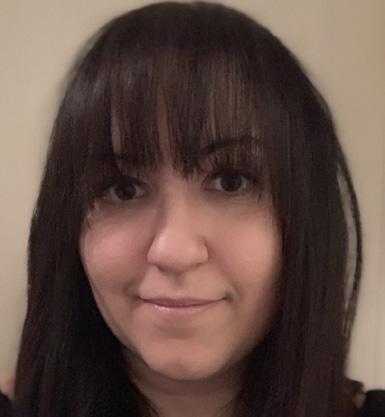
The Mindich Child Health and Development Institute 30
Eyal Shemesh, MD
John Bucuvalas, MD
Jeffrey M. Saland, MD
Bruce D. Gelb, MD
Andrew F. Stewart, MD
Scott H. Sicherer, MD
Joan Han, MD
Chris Gennings, PhD
Bryn D. Webb, MD
Marek Mlodzik, PhD
Son Duong, MD
Lauren Choleva, MD
Jaime Chu, MD
David Dunkin, MD
Megan Januska, MD
Rebecca Trachtman, MD
Katherine Guttman, MD, MBE
Nita Vangeepuram, MD, MPH
Georgia Panagiotakos, PhD

Collaborators in mentorship and recruitment
• Bruce D. Gelb, MD
• Andrew F. Stewart, MD
• Scott H. Sicherer, MD
• Joan Han, MD
• Eyal Shemesh, MD
• John Bucuvalas, MD
• Jeffrey M. Saland, MD
Faculty Highlight: Lisa M. Satlin, MD
Formal mentorship (as K award mentor)
• Jeffrey M. Saland, MD
• Katherine Guttman, MD, MBE
Mentorship in the Pediatric Faculty Scholar’s Program (pipeline program for pediatric physician-scientists)
• Son Duong, MD
• Lauren Choleva, MD
• Nita Vangeepuram, MD, MPH
• Jaime Chu, MD
• David Dunkin, MD
• Megan Januska, MD
• Rebecca Trachtman, MD
Collaboration through the PCTO
• Eyal Shemesh, MD
Anticipated research study collaboration (in progress)
• Georgia Panagiotakos, PhD
Co-authorship of publications
• Jeff M. Saland, MD
• John Bucuvalas, MD
• Bryn D. Webb, MD
• Bruce D. Gelb, MD
• Marek Mlodzik, PhD
• Chris Gennings, PhD
The Mindich Child Health and Development Institute 31



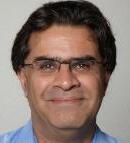
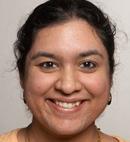

Faculty Highlight: Scott H. Sicherer, MD

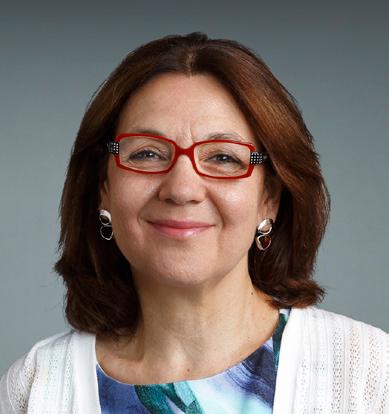
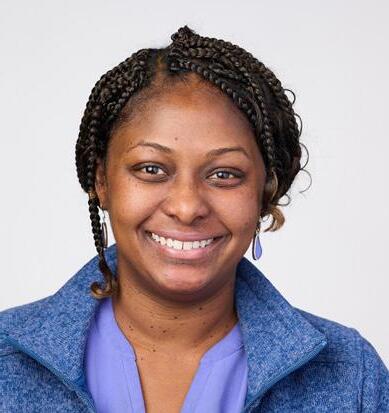

Supinda Bunyavanich, MD, MPH
• Collaborator on food allergy and eczema birth cohort study
• Collaborator on systems biology of early atopy analysis & bioinformatics center
• Collaborator on threshold, severity, and immunotherapy of peanut allergy
• Collaborator on gut microbiome in peanut allergy
• Collaborator on Consortium for Food Allergy Research (CoFAR)
• Collaborator on oral metabolite and immune trajectories study
• Collaborator on studies in the Food Allergy Treatment and Research Center
• Collaborator on food allergy research initiative (biosamples for pilot studies)
Bruce D. Gelb, MD
• Pediatric Clinical Trials Office
Maria Curotto de Lafaille, PhD
• Collaborator on B cell memory in human food allergy
• Collaborator on heterogeneity of T cell phenotype and function in food allergy
• Collaborator on Consortium for Food Allergy Research (CoFAR)
• Collaborator on studies in the Food Allergy Treatment and Research Center
• Collaborator on food allergy research initiative (biosamples for pilot studies)
Nicole Ramsey, MD, PhD
• Mentor
• Collaborator on JAK inhibition in adolescent and adult food allergy
• Collaborator on food allergy investigations for reaching equity in research
Jeffrey M. Saland, MD
• Collaborator as medical monitor on threshold, severity, and immunotherapy of peanut allergy
Hugh A. Sampson, MD
• Collaborator on Consortium for Food Allergy Research (CoFAR)
• Collaborator on threshold, severity, and immunotherapy of peanut allergy
• Collaborator on studies in the Food Allergy Treatment and Research Center
• Collaborator on food allergy research initiative (biosamples for pilot studies)
Eyal Shemesh, MD
• Pediatric Clinical Trials Office
• Collaborator on the EMPOWER program (food allergy studies and treatment for psychosocial and mental health)
Nita Vangeepuram, MD, MPH
• Collaborator on food allergy investigations for reaching equity in research
Julie Wang, MD
• Collaborator on food allergy patient samples for repository
• Collaborator on food allergy and eczema birth cohort study
• Collaborator on food allergy investigations for reaching equity in research
• Collaborator on food allergy clinical trials (pharmaceuticals)
• Collaborator on threshold, severity, and immunotherapy of peanut allergy
• Collaborator on Consortium for Food Allergy Research (CoFAR)
• Collaborator on studies in the Food Allergy Treatment and Research Center
The Mindich Child Health and Development Institute 32
Bruce D. Gelb, MD
Maria Curotto de Lafaille, PhD
Nicole Ramsey, MD, PhD
Jeffrey M. Saland, MD
Julie Wang, MD
Hugh A. Sampson, MD
Eyal Shemesh, MD
Nita Vangeepuram, MD, MPH
Supinda Bunyavanich, MD, MPH

AWARDS/HONORS AND PUBLICATIONS
The Mindich Child Health and Development Institute 33
FACULTY AWARDS/ HONORS
Sharon Baumel-Alterzon, PhD, The American Diabetes Association (ADA) 83rd Scientific Sessions, “Nrf2 Regulates Neonatal β-Cell Mass Expansion” oral talk
Dusan Bogunovic, PhD, International Cytokine & Interferon Society, ICIS-Luminex John R. Kettman Award for Excellence in Cytokine & Interferon Research
Supinda Bunyavanich, MD, MPH, MPhil, Chair, NIH Study Section: Cardiovascular and Respiratory Diseases, 2022-2024
Bruce D. Gelb, MD, Keynote Speaker, Pathologies of the RAS-MAPK Pathway: The Importance of a Multidisciplinary Network, Salerno, Italy, May 23, 2023
Bruce D. Gelb, MD, Plenary Speaker, 8th International RASopathies Symposium: Expanding Research and Care Practice, Through Global Collaboration and Advocacy, Denver, CO, August 23, 2023
Bruce D. Gelb, MD, Plenary Speaker, International Pediatric VAC and Heart Failure Summit 2023, St. Louis, MO, September 23, 2023
Praveen Raju, MD, PhD, CURE Childhood Cancer, 2023 Translation to CURE Award (T2C), 07/01/23-06/30/25, “Nanotherapeutic targeting of PPM1D inhibitors across the blood-brain barrier for pediatric brainstem tumors”
Praveen Raju, MD, PhD, Keynote Speaker, “Translational Hurdles in Pediatric Neuro-Oncology - The Elephants in the Room,” The BrainStorm Summit - End Childhood Brain Cancer, Washington, DC, September 22, 2023
Elvin Wagenblast, PhD, Pew-Stewart Scholars Program for Cancer Research, 2023 Scholar
FACULTY PUBLICATIONS
Woo JL, Nash KA, Dragan K, Crook S, Neidell M, Cook S, … Anderson BR; New York State Congenital Heart Surgery Collaborative for Longitudinal Outcomes and Utilization of Resources (CHS-COLOUR). Chronic Medication Burden After Cardiac Surgery for Pediatric Medicaid Beneficiaries. J Am Coll Cardiol. 2023 Sep 26;82(13):1331-1340.
Jayaram N, Allen P, Hall M, Karamlou T, Woo J, Crook S, Anderson BR. Adjusting for congenital heart surgery risk using administrative data. J Am Coll Cardiol. 2023 Dec 5;82(23):2212-21.
Crook S, Dragan K, Woo JL, Neidell M, Jiang P, Cook S, … Anderson BR Long-term health care utilization after cardiac surgery in children covered under medicaid. J Am Coll Cardiol. 2023 Apr 25;81(16):1605-17.
Tran M, Berin C Reservoirs of allergic memory Nat Rev Immunol. 2023 Mar 23:1.
Rottner AK, Ye Y, Navarro-Guerrero E, Rajesh V, Pollner A, Bevacqua RJ, … Gloyn AL. A genome-wide crispr screen identifies calcoco2 as a regulator of beta cell function influencing type 2 diabetes risk. Nat Genet. 2023 Jan;55(1):54-65.
Chen X, Pillay S, Lohmann F, Bieker JJ Association of ddx5/p68 protein with the upstream erythroid enhancer element (ehs1) of the gene encoding the klf1 transcription factor. J Biol Chem. 2023 Dec;299(12):105489.
Malle L, Patel RS, Martin-Fernandez M, Stewart OJ, Philippot Q, Buta S, … Trachtman R, … Bogunovic D Autoimmunity in down’s syndrome via cytokines, cd4 t cells and cd11c(+) b cells. Nature. 2023 Mar;615(7951):305-14.
Gruber CN, Patel RS, Trachtman R, Lepow L, Amanat F, Krammer F, Wilson KM, … Gelb BD, … Bogunovic D. Mapping systemic inflammation and antibody responses in multisystem inflammatory syndrome in children (mis-c). Cell. 2023 Jul 20;186(15):3325.
Wigby K, Hammer M, Tokita M, Patel P, Jones MC, Larson A, … Bragg J, … Del Campo M. Insights into the perinatal phenotype of kabuki syndrome in infants identified by genome-wide sequencing Am J Med Genet A. 2023 Apr;191(4):930-40.
The Mindich Child Health and Development Institute 34
Maron JL, Kingsmore S, Gelb BD, Vockley J, Wigby K, Bragg J, Stroustrup A, … Davis JM. Rapid whole-genomic sequencing and a targeted neonatal gene panel in infants with a suspected genetic disorder. Jama. 2023 Jul 11;330(2):161-9.
Osman A, Mervosh NL, Strat AN, Euston TJ, Zipursky G, Pollak RM, … Buxbaum JD, Breen MS, Kiraly DD. Acetate supplementation rescues social deficits and alters transcriptional regulation in prefrontal cortex of shank3 deficient mice Brain Behav Immun. 2023 Aug 30;114:311-24.
Park MD, Reyes-Torres I, LeBerichel J, Hamon P, LaMarche NM, Hegde S, … Brown BD, … Merad M. Trem2 macrophages drive nk cell paucity and dysfunction in lung cancer. Nat Immunol. 2023 May;24(5):792-801.
Brown BD, Fauci AS, Belkaid Y, Merad M. Rna vaccines: A transformational advance. Immunity. 2023 Dec 12;56(12):2665-9.
Mayo AT, Myers CG, Bucuvalas JC, Feng S, Juliano CE. Supporting robust teamwork - bridging technology and organizational science. N Engl J Med. 2023 Jun 1;388(22):2019-21.
Budu-Aggrey A, Kilanowski A, Sobczyk MK, Shringarpure SS, Mitchell R, Reis K, … Bunyavanich S, …Paternoster L. European and multi-ancestry genome-wide association meta-analysis of atopic dermatitis highlights importance of systemic immune regulation. Nat Commun. 2023 Oct 4;14(1):6172.
Liu D, Meyer D, Fennessy B, Feng C, Cheng E, Johnson JS, … Buxbaum JD, … Charney AW. Schizophrenia risk conferred by rare protein-truncating variants is conserved across diverse human populations. Nat Genet. 2023 Mar;55(3):369-76.
Grandjean J, Desrosiers-Gregoire G, Anckaerts C, Angeles-Valdez D, Ayad F, Barrière DA, … Buxbaum JD, … Hess A. A consensus protocol for functional connectivity analysis in the rat brain. Nat Neurosci. 2023 Apr;26(4):673-81.
Weinstock JS, Gopakumar J, Burugula BB, Uddin MM, Jahn N, Belk JA, … Chami N, … Loos RJF, … Jaiswal S. Aberrant activation of tcl1a promotes stem cell expansion in clonal haematopoiesis. Nature. 2023 Apr 12.
Ursini G, Di Carlo P, Mukherjee S, Chen Q, Han S, Kim J, … Chen J, Hao K, … Weinberger DR. Prioritization of potential causative genes for schizophrenia in placenta. Nat Commun. 2023 May 15;14(1):2613.
Choleva L, Wang P, Liu H, Wood O, Lambertini L, Scott DK, Karakose E, Stewart AF Structure-function analysis of p57kip2 in the human pancreatic beta cell reveals a bipartite nuclear localization signal. Endocrinology 2023 Dec 23;165(2).
India-Aldana S, Yao M, Midya V, Colicino E, Chatzi L, Chu J, Gennings C, … Loos RJF, … Walker RW, … Valvi D. Pfas exposures and the human metabolome: A systematic review of epidemiological studies. Curr Pollut Rep. 2023 Sep;9(3):510-68.
Leiding JW, Vogel TP, Santarlas VGJ, Mhaskar R, Smith MR, Carisey A, … Cunningham-Rundles C, … Forbes Satter LR. Monogenic early-onset lymphoproliferation and autoimmunity: Natural history of stat3 gain-of-function syndrome. J Allergy Clin Immunol. 2023 Apr;151(4):1081-95.
Le Voyer T, Parent AV, Liu X, Cederholm A, Gervais A, Rosain J, … Cunningham-Rundles C, … Puel A. Autoantibodies against type i ifns in humans with alternative nf-κb pathway deficiency. Nature. 2023 Nov;623(7988):803-13.
Salamon I, Park Y, Miškić T, Kopić J, Matteson P, Page NF, … De Rubeis S, … Rasin MR. Celf4 controls mrna translation underlying synaptic development in the prenatal mammalian neocortex. Nat Commun. 2023 Sep 27;14(1):6025.
Miura A, Sarmah H, Tanaka J, Hwang Y, Sawada A, Shimamura Y, … Dubois NC, … Mori M. Conditional blastocyst complementation of a defective foxa2 lineage efficiently promotes the generation of the whole lung. Elife 2023 Oct 20;12.
Spencer EA, Bergstein S, Dolinger M, Pittman N, Kellar A, Dunkin D, Dubinsky MC. Single-center experience with upadacitinib for adolescents with refractory inflammatory bowel disease. Inflamm Bowel Dis. 2023 Dec 22.
The Mindich Child Health and Development Institute 35
Duong SQ, Elfituri MO, Zaniletti I, Ressler RW, Noelke C, Gelb BD, … Anderson BR Neighborhood childhood opportunity, race/ethnicity, and surgical outcomes in children with congenital heart disease. J Am Coll Cardiol. 2023 Aug 29;82(9):801-13.
Siegal AR, Paul M, Malhotra NR, Miller E, Ho P, Masseaux J, … Ferrer FA. Does kub play a role in the diagnosis of bladder bowel dysfunction? J Pediatr Urol. 2023 Nov 4.
Williams ZJ, Schaaf R, Ausderau KK, Baranek GT, Barrett DJ, Cascio CJ, … Foss-Feig JH, … Woynaroski TG. Examining the latent structure and correlates of sensory reactivity in autism: A multi-site integrative data analysis by the autism sensory research consortium. Mol Autism. 2023 Aug 28;14(1):31.
Ushpol A, Je S, Niles D, Majmudar T, Kirschen M, Del Castillo J, … Gangadharan S. Association of blood pressure with neurologic outcome at hospital discharge after pediatric cardiac arrest resuscitation. Resuscitation. 2023 Dec 4;194:110066.
Canales-Herrerias P, Garcia-Carmona Y, Shang J, Meringer H, Yee DS, Radigan L… Bogunovic D, … Cunningham-Rundles C, … Mehandru S. Selective iga2 deficiency in a patient with small intestinal crohn’s disease. J Clin Invest. 2023 Jun 15;133(12).
Çakan E, Ah Kioon MD, Garcia-Carmona Y, Glauzy S, Oliver D, Yamakawa N, … Cunningham-Rundles C, … Meffre E. Tlr9 ligand sequestration by chemokine cxcl4 negatively affects central b cell tolerance. J Exp Med. 2023 Dec 4;220(12).
Kang RB, Li Y, Rosselot C, Zhang T, Siddiq M, Rajbhandari P, Stewart AF, Scott DK, Garcia-Ocana A, Lu G. Single-nucleus rna sequencing of human pancreatic islets identifies novel gene sets and distinguishes β-cell subpopulations with dynamic transcriptome profiles. Genome Med. 2023 May 1;15(1):30.
Yu M, Aguirre M, Jia M, Gjoni K, Cordova-Palomera A, Munger C, … Loos RJF, Chami N, … Gelb BD, Priest JR. Oligogenic architecture of rare noncoding variants distinguishes 4 congenital heart disease phenotypes. Circ Genom Precis Med. 2023 Apr 7:e003968.
Jain N, Richter F, Adzhubei I, Sharp AJ, Gelb BD Small open reading frames: A comparative genetics approach to validation. BMC Genomics. 2023 May 1;24(1):226.
Abul-Husn NS, Marathe PN, Kelly NR, Bonini KE, Sebastin M, Odgis JA, … Gelb BD. Molecular diagnostic yield of genome sequencing versus targeted gene panel testing in racially and ethnically diverse pediatric patients Genet Med. 2023 Sep;25(9):100880.
Agyapong PD, Jack D, Kaali S, Colicino E, Mujtaba MN, Chillrud SN, … Gennings C, … Lee AG. Household air pollution and child lung function: The ghana randomized air pollution and health study. Am J Respir Crit Care Med. 2023 Nov 28.
Tsetsos F, Topaloudi A, Jain P, Yang Z, Yu D, Kolovos P, … Buxbaum JD, Grice D, … Paschou P. Genome-wide association study points to novel locus for gilles de la tourette syndrome. Biol Psychiatry. 2023 Feb 2.
Bernard S, Hebert C, Katz C, Mogilner L, Weintraub A, Bragg J, Guttmann KF Maternal and staff perceptions of shared reading in the neonatal intensive care unit. J Perinatol. 2023 Apr;43(4):529-31.
Stephenson EJ, Kinney CE, Stayton AS, Han JC Energy expenditure deficits drive obesity in a mouse model of Alström syndrome. Obesity (Silver Spring). 2023 Nov;31(11):2786-98.
Beaumont RN, Flatley C, Vaudel M, Wu X, Chen J, Moen GH, … Hao K, … Njølstad PR. Genome-wide association study of placental weight identifies distinct and shared genetic influences between placental and fetal growth Nat Genet. 2023 Nov;55(11):1807-19.
Leithead AB, Godino A, Barbier M, Harony-Nicolas H Social Interaction Elicits Activity in Glutamatergic Neurons in the Posterior Intralaminar Complex of the Thalamus. Biol Psychiatry. 2023 May 26:S00063223(23)01304-5.
The Mindich Child Health and Development Institute 36
Invernizzi A, Rechtman E, Oluyemi K, Renzetti S, Curtin P, Colicino E, … Reichenberg A, … Horton MK Topological network properties of resting-state functional connectivity patterns are associated with metal mixture exposure in adolescents. Front Neurosci. 2023;17:1098441.
Taye N, Singh M, Baldock C, Hubmacher D Secreted adamts-like 2 promotes myoblast differentiation by potentiating wnt signaling. Matrix Biol. 2023 Jun;120:24-42.
Wu Y, Gettler K, Kars ME, Giri M, Li D, Bayrak CS, … Itan Y Identifying high-impact variants and genes in exomes of ashkenazi jewish inflammatory bowel disease patients. Nat Commun. 2023 Apr 20;14(1):2256.
Stein D, Kars ME, Wu Y, Bayrak Ç S, Stenson PD, Cooper DN, … Itan Y Genome-wide prediction of pathogenic gain- and loss-of-function variants from ensemble learning of a diverse feature set Genome Med. 2023 Nov 30;15(1):103.
Zaks N, Batuure A, Lin E, Rommel AS, Reichenberg A, Grice D, … Mahjani B, Janecka M Association between mental health and reproductive system disorders in women: A systematic review and meta-analysis. JAMA Netw Open. 2023 Apr 3;6(4):e238685.
Ehlers A, Wild J, Warnock-Parkes E, Grey N, Murray H, Kerr A, … Janecka M, … Clark DM. Therapist-assisted online psychological therapies differing in trauma focus for post-traumatic stress disorder (stop-ptsd): A ukbased, single-blind, randomised controlled trial. Lancet Psychiatry. 2023 Aug;10(8):608-22.
Januska MN, Langfelder-Schwind E, Vicencio AG, Berdella MN. Persistent lobar atelectasis in an infant with cystic fibrosis: The role for flexible bronchoscopy and poractant alfa. Pediatr Pulmonol. 2023 Nov 17.
Nelin TD, Scott KA, Just AC, Burris HH. Place-based strategies addressing neighborhood environments to improve perinatal and preterm infant outcomes. Children (Basel). 2023 Oct 2;10(10).
Katz LS, Brill G, Wang P, Lambertini L, Zhang P, Haldeman JM, … Stewart AF, Garcia-Ocaña A, Scott DK Transcriptional activation of the myc gene by glucose in β-cells requires a chrebp-dependent 3-d chromatin interaction between the myc and pvt1 genes. Mol Metab. 2023 Nov 30;79:101848.
Frank Y, Levy T, Lozano R, Friedman K, Underwood S, Kostic A, … Kolevzon A. Gait abnormalities in children with phelan-mcdermid syndrome. J Child Neurol. 2023 Dec;38(13-14):665-71.
Lui MM, Shadrina M, Gelb BD, Kontorovich AR Features of vascular ehlers-danlos syndrome among biobank participants harboring predicted high-risk col3a1 genotypes. Circ Genom Precis Med. 2023 Apr;16(2):e003864.
Miranda-Waldetario MCG, Curotto de Lafaille MA. Making good of a tricky start: How ige and mast cells manage a protective sway in food allergy. Immunity. 2023 Sep 12;56(9):1988-90.
Lesseur C, Kaur K, Kelly SD, Hermetz K, Williams R, Hao K, … Chen J Effects of prenatal pesticide exposure on the fetal brain and placenta transcriptomes in a rodent model. Toxicology. 2023 May 15;490:153498.
Liu SH, Feuerstahler L, Chen Y, Braun JM, Buckley JP. Toward advancing precision environmental health: Developing a customized exposure burden score to pfas mixtures to enable equitable comparisons across population subgroups, using mixture item response theory. Environ Sci Technol. 2023 Nov 21;57(46):18104-15.
Wang A, Shen J, Rodriguez AA, Saunders EJ, Chen F, Janivara R, … Loos RJF, … Haiman CA. Characterizing prostate cancer risk through multi-ancestry genome-wide discovery of 187 novel risk variants. Nat Genet. 2023 Dec;55(12):2065-74.
Jakubek YA, Zhou Y, Stilp A, Bacon J, Wong JW, Ozcan Z, … Loos RJF, … Auer PL. Mosaic chromosomal alterations in blood across ancestries using whole-genome sequencing. Nat Genet. 2023 Nov;55(11):1912-9.
Gupta Y, Friedman DJ, McNulty MT, Khan A, Lane B, Wang C, … Loos RJF, … Sanna-Cherchi S. Strong protective effect of the apol1 p.N264k variant against g2-associated focal segmental glomerulosclerosis and kidney disease. Nat Commun. 2023 Nov 30;14(1):7836.
The Mindich Child Health and Development Institute 37
Mahjani B, Klei L, Buxbaum Grice AS, Larsson H, Hultman CM, Sandin S, … Buxbaum JD, Grice DE Direct additive genetics and maternal effect contribute to the risk of tourette disorder. J Neurol Neurosurg Psychiatry. 2023 Aug;94(8):638-42.
Bravo P, Liu Y, Draper BW, Marlow FL. Macrophage activation drives ovarian failure and masculinization in zebrafish. Sci Adv. 2023 Nov 24;9(47):eadg7488.
Martin-Trujillo A, Garg P, Patel N, Jadhav B, Sharp AJ Genome-wide evaluation of the effect of short tandem repeat variation on local DNA methylation. Genome Res. 2023 Feb;33(2):184-96.
Collu GM, Mlodzik M The beauty of seeing the real thing: Bmp heterodimer detection in vivo reveals dimer composition and activity. Dev Cell. 2023 Apr 24;58(8):633-4.
Humphries AC, Molina-Pelayo C, Sil P, Hazelett CC, Devenport D, Mlodzik M A van gogh/vangl tyrosine phosphorylation switch regulates its interaction with core planar cell polarity factors prickle and dishevelled. PLoS Genet. 2023 Jul;19(7):e1010849.
Meng X, Yao D, Imaizumi K, Chen X, Kelley KW, Reis N, … Panagiotakos G, … Pașca SP. Assembloid crispr screens reveal impact of disease genes in human neurodevelopment. Nature. 2023 Oct;622(7982):359-66.
Docherty AR, Mullins N, Ashley-Koch AE, Qin X, Coleman JRI, Shabalin A, … Pinto D, …Ruderfer DM. Gwas meta-analysis of suicide attempt: Identification of 12 genome-wide significant loci and implication of genetic risks for specific health factors. Am J Psychiatry. 2023 Oct 1;180(10):723-38.
Ramsey N, Kazmi W, Phelan M, Lozano-Ojalvo D, Berin MC. Jak1 inhibition with abrocitinib decreases allergen-specific basophil and t-cell activation in pediatric peanut allergy. J Allergy Clin Immunol Glob. 2023 Aug;2(3).
Rotella K, Apter AJ, Davis CM, Nyenhuis SM, Ramsey NB Race-specific reference equations are worse than universal equations at predicting chronic obstructive pulmonary disease outcomes. J Allergy Clin Immunol Pract. 2023 Feb;11(2):664-5.
Levine SZ, Rotstein A, Kodesh A, Sandin S, Lee BK, Weinstein G, Schnaider Beeri M, Reichenberg A Adult attention-deficit/hyperactivity disorder and the risk of dementia. JAMA Netw Open. 2023 Oct 2;6(10):e2338088.
Martino P, Sunkara R, Heitman N, Rangl M, Brown A, Saxena N, … Rendl M Progenitor-derived endothelin controls dermal sheath contraction for hair follicle regression. Nat Cell Biol. 2023 Feb;25(2):222-34.
Suleri A, White T, Blok E, Cecil CAM, Reiss I, Jaddoe VWV, … Rommel AS The association between prenatal infection and adolescent behavior: Investigating multiple prenatal, perinatal, and childhood second hits. J Am Acad Child Adolesc Psychiatry. 2023 Dec;62(12):1340-50.
Sampson HA, Hamilton RG. Advances in the assessment and management of allergic sensitization. J Allergy Clin Immunol Pract. 2023 Oct;11(10):3008-9.
Carrisoza-Gaytan R, Kroll KT, Hiratsuka K, Gupta NR, Morizane R, Lewis JA, Satlin LM Functional maturation of kidney organoid tubules: Piezo1-mediated ca(2+) signaling. Am J Physiol Cell Physiol. 2023 Mar 1;324(3):C757-c68.
Shemesh E, Duncan-Park S, Mazariegos G, Annunziato R, Anand R, Reyes-Mugica M, … Shneider BL. The improving medication adherence in adolescents and young adults following liver transplantation (imalt) multisite trial: Design and trial implementation considerations. Clin Trials. 2023 Oct;20(5):528-35.
Baker MG, Cox A, Kattan JD, Oriel RC, Tsuang A, Agyemang A, … Wang J, Sicherer SH Experience transitioning post-food allergy clinical trial participants to daily ingestion of retail food equivalents. J Allergy Clin Immunol Pract. 2023 Nov 14.
The Mindich Child Health and Development Institute 38
Siecinski SK, Giamberardino SN, Spanos M, Hauser AC, Gibson JR, Chandrasekhar T, Trelles MDP, … Siper P, … Kolevzon A, … Gregory SG. Genetic and epigenetic signatures associated with plasma oxytocin levels in children and adolescents with autism spectrum disorder Autism Res. 2023 Mar;16(3):502-23.
Jimenez-Gonzalez M, Stanley S. Optogenetic control of β cell function. Nat Biomed Eng. 2023 Dec 6.
Stewart AF, Lepack AE, Fulton SL, Safovich P, Maze I. Histone h3 dopaminylation in nucleus accumbens, but not medial prefrontal cortex, contributes to cocaine-seeking following prolonged abstinence. Mol Cell Neurosci 2023 Feb 24;125:103824.
Stroustrup A, Zhang X, Spear E, Bandyopadhyay S, Narasimhan S, Meher AK, … Teitelbaum SL, … Gennings C, Aschner JL. Phthalate exposure in the neonatal intensive care unit is associated with development of bronchopulmonary dysplasia. Environ Int. 2023 Aug;178:108117.
Ghersi JJ, Baldissera G, Hintzen J, Luff SA, Cheng S, Xia IF, Sturgeon CM, Nicoli S. Haematopoietic stem and progenitor cell heterogeneity is inherited from the embryonic endothelium. Nat Cell Biol. 2023 Aug;25(8):1135-45.
Barrett ES, Sharghi S, Thurston SW, Sobolewski Terry M, Loftus CT, … Swan SH, Sathyanarayana S. Associations of exposure to air pollution during the male programming window and mini-puberty with anogenital distance and penile width at birth and at 1 year of age in the multicenter U.S. Tides cohort. Environ Health Perspect. 2023 Nov;131(11):117001.
Midya V, Alcala CS, Rechtman E, Gregory JK, Kannan K, Hertz-Picciotto I, Teitelbaum SL, Gennings C, … Valvi D. Machine learning assisted discovery of interactions between pesticides, phthalates, phenols, and trace elements in child neurodevelopment. Environ Sci Technol. 2023 Nov 21;57(46):18139-50.
Tiozzo C, Manzano C, Lin X, Bowler S, Gurzenda E, Botros B, … Hanna N. Placental sars-cov-2 viral replication is associated with placental coagulopathy and neonatal complications. Am J Obstet Gynecol. 2023 Nov 10.
Greene D, Pirri D, Frudd K, Sackey E, Al-Owain M, Giese APJ, … Gelb BD, … Turro E Genetic association analysis of 77,539 genomes reveals rare disease etiologies. Nat Med. 2023 Mar;29(3):679-88.
Verdier H, Thomas P, Batista J, Kempster C, McKinney H, Gleadall N, … Turro E. A signature of platelet reactivity in cbc scattergrams reveals genetic predictors of thrombotic disease risk. Blood. 2023 Nov 30;142(22):1895-908.
Liu J, Zhou Z, Cheng X, Vangeepuram N Geographic and sociodemographic variations in prevalence of mental health symptoms among us youths, 2022. Am J Public Health. 2023 Oct;113(10):1116-9.
Saniei S, Wagenblast E Epitope base editing: Non-malignant stem cells are going undercover. Cell Stem Cell 2023 Nov 2;30(11):1400-2.
Kittrell HD, DiMenna FJ, Arad AD, Oh W, Hofer I, Walker RW, Loos RJF, … Nadkarni GN. Discrepancy between predicted and measured exercise intensity for eliciting the maximal rate of lipid oxidation. Nutr Metab Cardiovasc Dis. 2023 Jul 15.
Zhao L, Wang Y, Jaganathan A, Sun Y, Ma N, Li N, … Walsh MJ, … Cheung KL. Brd4-prc2 represses transcription of t-helper 2-specific negative regulators during t-cell differentiation. Embo j. 2023 Mar 15;42(6):e111473.
Wang J, Wood RA, Raymond S, Suárez-Fariñas M, Yang N, Sicherer SH, Sampson HA, Li XM. Double-blind, placebo-controlled study of e-b-fahf-2 in combination with omalizumab-facilitated multiallergen oral immunotherapy. J Allergy Clin Immunol Pract. 2023 Jul;11(7):2208-16.e1.
Webb BD, Nowinski SM, Solmonson A, Ganesh J, Rodenburg RJ, Leandro J, … Gelb BD, … Houten SM. Recessive pathogenic variants in mcat cause combined oxidative phosphorylation deficiency. Elife. 2023 Mar 7;12.
Tenney AP, Di Gioia SA, Webb BD, Chan WM, de Boer E, Garnai SJ, … Engle EC. Noncoding variants alter gata2 expression in rhombomere 4 motor neurons and cause dominant hereditary congenital facial paresis. Nat Genet. 2023 Jul;55(7):1149-63.
The Mindich Child Health and Development Institute 39
The Mindich Child Health and Development Institute 40 GRANTS AGENCY NAME Funding from New Grants ($) Funding from New & Existing Grants ($) Department of The Army 1,687,000 1,687,000 National Institute of Mental Health/NIH/DHHS 1,376,917 8,705,195 National Institute of Environmental Health Sciences/NIH/DHHS 813,948 1,625,588 National Institute of Allergy And Infectious Diseases/NIH/DHHS 808,751 8,536,842 National Institute On Aging/NIH/DHHS 746,162 915,162 National Heart, Lung, And Blood Institute/NIH/DHHS 668,965 3,307,547 Emory University 401,959 401,959 Juvenile Diabetes Research Foundation 330,883 330,883 Alex’s Lemonade Stand Foundation for Childhood Cancer 200,000 200,000 Damon Runyon Cancer Research Foundation 200,000 200,000 Eli Lilly And Company 196,460 196,460 Rockefeller University 175,000 175,000 University of Pittsburgh 174,906 526,934 National Institute of Child Health And Human Development/NIH/DHHS 169,000 4,090,782 CURE Childhood Cancer 165,000 165,000 Vanderbilt University Medical Center 102,465 102,465 Job Research Foundation 100,000 100,000 Children’s Hospital Med. Center, Ohio 100,000 150,000 CureSearch for Children’s Cancer 75,000 75,000 Pew Charitable Trusts 75,000 75,000 Healthfirst 55,000 55,000 ASE Foundation 25,000 25,000 Indiana University 22,205 22,205 Columbia University 19,621 242,663 University of California, San Diego 18,104 18,104 Food Allergy Research & Education 399 100,399 National Institute of Diabetes And Digestive And Kidney Diseases/NIH/DHHS 7,003,945 National Institute of Arthritis & Musculoskeletal & Skin Diseases/NIH/DHHS 2,689,278 Benaroya Research Institute At Virginia 2,359,666 National Institute of General Medical Sciences/NIH/DHHS 1,157,555 Johns Hopkins University Medical School 1,150,931 National Center for Complementary and Integrative Health/NIH/DHHS 704,657 National Institute of Dental And Craniofacial Research/NIH/DHHS 605,148 Albert Einstein College of Medicine 496,759 National Eye Institute/NIH/DHHS 436,725 University of Wisconsin-Madison 378,090 National Center for Advancing Translational Sciences/NIH/DHHS 338,000 Northwestern University 308,797 Additional Ventures Foundation 280,459 Simons Foundation 241,196 New York University Grossman School of Medicine 209,122 ChadTough Defeat DIPG Foundation 200,000 President and Fellows of Harvard College 183,846 Brigham And Women’s Hospital 181,347 Memorial Sloan-Kettering Cancer Center 180,579 Biomarin Pharmaceutical 171,185 Boston Children’s Hospital 156,201 Leducq Foundation (Fondation Leducq) 154,935 University of Colorado 146,824 Adventist Health System/Sunbelt, Inc. 143,871 Children’s Hospital Pittsburgh 133,246 BrightFocus Foundation 100,000 Duke (Doris) Charitable Foundation 92,635 Virginia Commonwealth University 82,819 American Society of Hematology 62,500 European Commission 57,909 University of Cambridge 53,820 Alzheimer’s Association 51,480 FRAXA Research Foundation 50,000 RTW Charitable Foundation 50,000 Children’s Hospital of Philadelphia 44,613 Hirschl/Weill-Caulier Trust 40,000 Brain and Behavior Research Foundation 35,000 University of Southern California 19,117 Total 8,707,744 52,782,442
The Mindich Child Health and Development Institute 41
MATERIAL
Research Focus Outgoing Material Transfer Agreements (#) Licenses (#) Neurodevelopmental disorders 2 8 Cardiovascular disease 0 6 Diabetes and Obesity 1 5 Allergy and Asthma 1 8 Others 5 2 Total 9 29 Licenses Total Number Antigens/Antibodies 7 Reagents/Methods/Cell Lines 11 Genes/Adapters/Vectors/Oligonucleotides 6 Gene Testing/Therapeutics 3 Mouse and Cell Models 2 Total 29
OUTGOING
TRANSFER AGREEMENTS/LICENSES
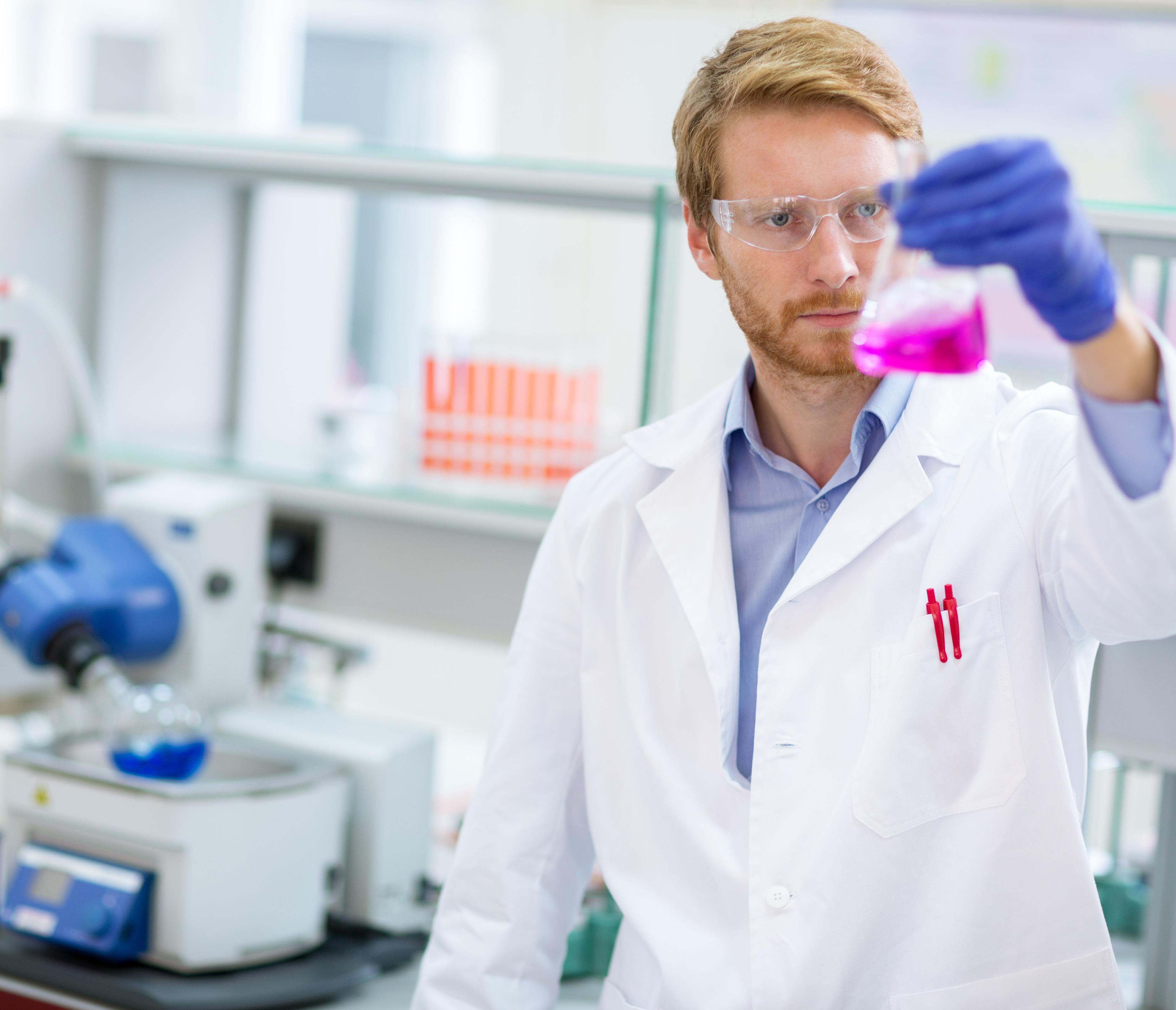
PILOT PROJECTS FUNDED FOR 2023
The Mindich Child Health and Development Institute 42
TRAINEE PILOT AWARDS
Two new trainee awardees were selected for the trainee pilot program in the amount of $10K over a one-year period. The purpose of the program is to support postdoctoral/clinical fellows or PhD/MD-PhD students in pursuing an independently funded research project that is separate from their ongoing projects under their current Principal Investigator/mentor. Successful applications were required to a) demonstrate that they can achieve independence and will generate preliminary data that could lead to career development or other grants and b) be relevant to children’s health.

Marta Garcia-Forn, PhD
Postdoctoral Fellow, Department of Psychiatry, Seaver Autism Center for Research and Treatment, Friedman Brain Institute, The Mindich Child Health and Development Institute, The Alper Center for Neural Development and Regeneration
Project Title: Lineage Tracing of Glutamatergic Neurons in the Developing Cortex of a Mouse Model of DDX3X Syndrome
Primary Mentor:
Silvia De Rubeis, PhD
Associate Professor, Psychiatry
Seaver Autism Center for Research and Treatment, Friedman Brain Institute
The Mindich Child Health and Development Institute, The Alper Center for Neural Development and Regeneration
Secondary Mentors:
Mladen-Roko Rasin, MD, PhD, Neuroscience and Cell Biology
Rutgers University, RWJ Medical School
Nikolaos P. Daskalakis, MD, PhD
Harvard Medical School, McLean Hospital

Katherine Schertz Hickey, MD
Clinical Fellow, Pediatric Intensive Care Unit
Project Title: Markers of Immune Dysregulation in Pediatric Patients With Severe Presentation of Viral Bronchiolitis
Primary Mentor:
Dusan Bogunovic, PhD
Director of the Center for Inborn Errors of Immunity
Associate Professor of Microbiology, Oncological Sciences, and Pediatrics
The Mindich Child Health and Development Institute, Precision Immunology Institute
Secondary Mentors:
Sandeep Gangadharan, MD
Medical Director of Mount Sinai Pediatric ICU
Alfin Vincencio, MD
Division Chief of Pediatric Pulmonology
The Mindich Child Health and Development Institute 43
FACULTY PILOT AWARDS
Two pilot projects were selected for $75K in institutional funding for a one-year period starting March 1, 2023. The purpose of the pilot program is to provide MCHDI faculty with funding for initial stages of research projects, with the goal of generating sufficient data to apply for larger, external grants. Projects are encouraged that are likely to: a) improve children’s health, b) promote collaboration within the MCHDI, and c) leverage additional extramural funding for the Principal Investigators (PIs).
Project Title: Structure-Function Studies of Ara h 2 Specific Antibodies Isolated From Highly Sensitized Children With Peanut Allergy
Principal Investigators: Maria Curotto de Lafaille, PhD (Communicating PI), and Goran Bajic, PhD (Co-PI)
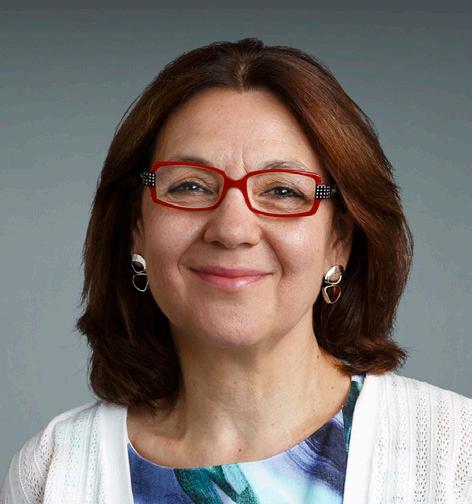
Maria Curotto de Lafaille, PhD (Communicating PI) Professor, Pediatrics, and Immunology and Immunotherapy
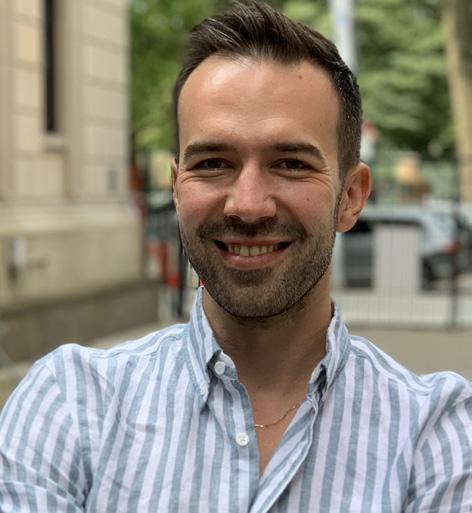
Goran Bajic, PhD (Co-PI) Assistant Professor, Microbiology
Project Title: Irritable Bowel Syndrome: An Antigenic Driven Disease?
Principal Investigators: David Dunkin, MD (Communicating PI), and Maria Curotto de Lafaille, PhD (Co-PI)

David Dunkin, MD (Communicating PI) Associate Professor, Pediatrics
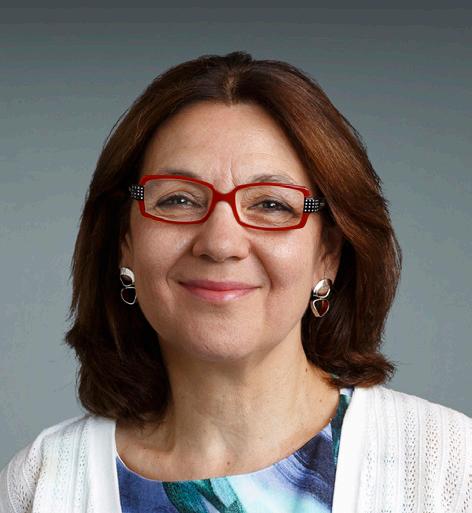
Maria Curotto de Lafaille, PhD (Co-PI) Professor, Pediatrics, and Immunology and Immunotherapy
The Mindich Child Health and Development Institute 44
COMMUNICATIONS
The MCHDI delivers the latest updates on research advancements, events, and news, both internally and externally, via various communications channels. Below is information about the MCHDI website, newsletter, and social media platforms.
Website
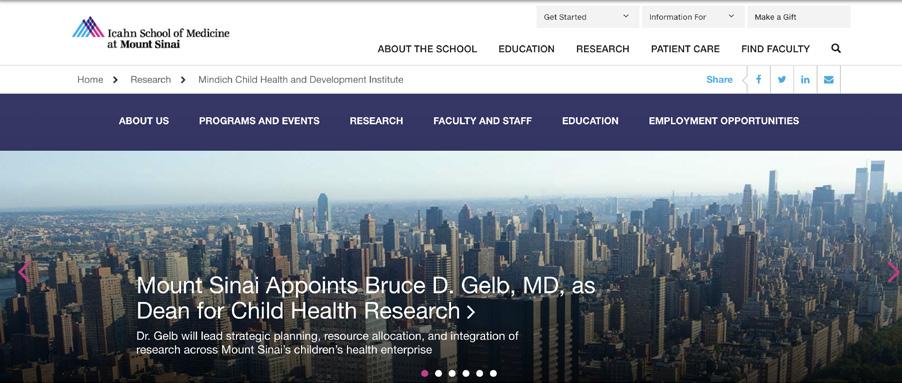
Newsletter
Our website includes detailed information about our signature programs, shared resources, trainee education, and employment opportunities. You can also find our complete list of faculty and links to their research websites as well as the latest press releases featuring our faculty. Our annual reports and MCHDI newsletters are also accessible via our website. Please visit our website at www.mountsinai.org/mchdi
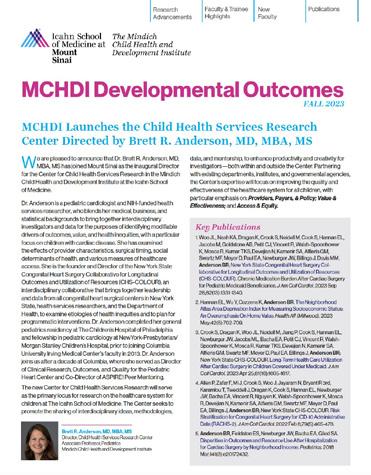
MCHDI Developmental Outcomes is a biannual newsletter distributed internally to faculty, trainees, and other Institute affiliates to highlight important research breakthroughs, pub- lications, awards, and events within the MCHDI. View our latest newsletters at http://icahn. mssm.edu/research/mindich/about/newsletters
Facebook
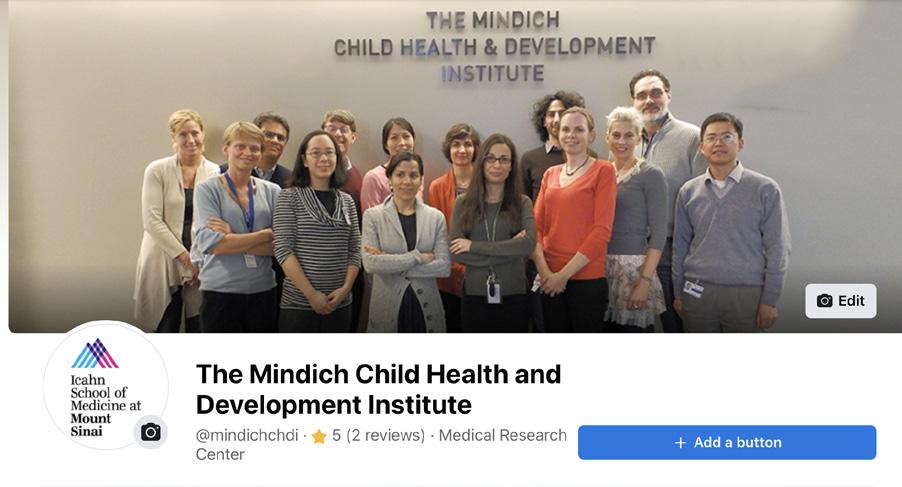
Our official MCHDI Facebook page was launched in 2014 and currently has 500+ likes and followers. Our team posts almost daily to share updates on faculty research, seminars, and events, and other information relevant to children’s health. Please like and follow our page at www.facebook.com/mindichchdi.
Twitter
Our tweets are streaming on our website in real time. Follow or tweet us @MindichCHDI or visit our website at www.mountsinai.org/mchdi
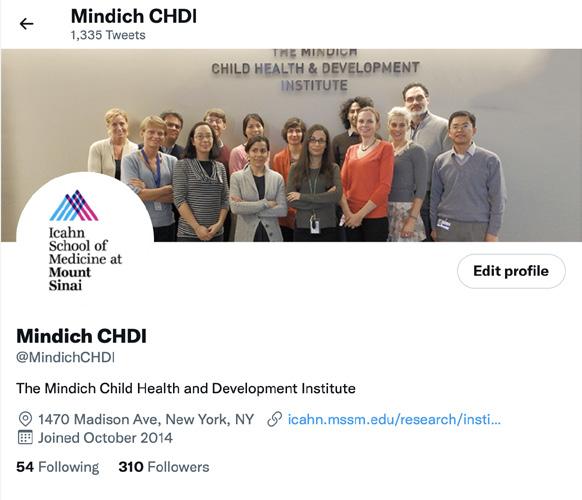
The Mindich Child Health and Development Institute 45

SHARED RESOURCES
The Mindich Child Health and Development Institute 46
GRANTFORWARD
GrantForward is a pre-award funding database with a comprehensive list of federal, foundation, and other funding sources. It offers a user-friendly search interface, automated email alerts, and tailored grant recommendations. GrantForward subscriptions for MCHDI faculty and trainees are covered by our institute.
To sign up, please visit: https://www.grantforward.com
BIOME BIOBANK
The BioMe Biobank contains the largest collection of DNA and plasma samples at Mount Sinai, enabling high-throughput disease genotyping and phenotyping while maintaining patient confidentiality through the Epic electronic medical record (EMR). The goal is to integrate patient clinical care information and research data. Observational epidemiologic studies of children have expanded in the past decade in response to the rising prevalence of childhood diseases, including obesity, autism, and asthma, and of environmental risk factors, such as lead and pesticides, and the ability to genotype DNA has enabled further inquiry into the genetic basis of childhood diseases. The MCHDI, in collaboration with the Charles R. Bronfman Institute for Personalized Medicine, is funding the collection of DNA samples from pediatric patients with allergies, and since February 2012, the Jaffe Food Allergy Institute has recruited >1000 enrollees. The pediatric cohort is composed of samples from diverse racial and ethnic groups.
For more information, please visit: https://icahn.mssm.edu/research/ipm/programs/biome-biobank.
BIOREPOSITORY CORE SHARED RESOURCE FACILITY
The biorepository CORE facility provides basic histology services, such as processing and embedding section fixed and frozen tissues from animal or human sources. In addition, services include DNA/RNA/miRNA extractions, preparing and analyzing tissue microarrays, and supporting functions for tissue procurement, both from consented and anonymized collections.
For a full list of their services, visit their website at: http://icahn.mssm.edu/research/resources/shared-resource-facilities/histology.
The Mindich Child Health and Development Institute 47
STRATEGIC PLAN IMPLEMENTATION
PEDIATRIC CLINICAL TRIALS OFFICE
INTRODUCTION
The Pediatric Clinical Trials Office (PCTO) within the Mindich Child Health and Development Institute (MCHDI) has emerged as a pivotal resource, addressing the research needs of investigators within the Mount Sinai Health System, particularly in the realm of pediatric clinical trials. Its inception in the aftermath of the pandemic surge in Fall 2020 underscores a strategic response to the evolving landscape of health care challenges.
A notable aspect of the PCTO’s operational framework is its collaborating with the Clinical Trials Office (CTO) in Internal Medicine. This collaboration extends its purview to the adept management of a spectrum of trials, encompassing investigator-initiated, industry-funded, and federally funded endeavors. Of particular interest is the PCTO’s commitment to facilitating “extension” trials, wherein the studies extend seamlessly from adult to the pediatric population. This nuanced approach speaks volumes about the adaptability and foresight in catering to the intricacies of diverse clinical research changes.
PCTO STAFF
Michele Cohen, MS, CCRC – Co-Director/Eyal Shemesh, MD – Co-Director
Yair Bitton, MPH, MBA, CCRP – Assistant Director
Navjot Kaur – Financial Analyst
Angela Stangarone – Senior Regulatory Coordinator
Alyssa Gontzes – Clinical Research Coordinator II
Gabrielle Jonny – Clinical Research Coordinator II
In 2023, the PCTO added a Clinical Trials Manager and two additional CRCs:
Xueru Mu, CCRP – Clinical Trials Manager
Tarini Vats – Clinical Research Coordinator II
Maha Hussain – Clinical Research Coordinator II
Adding a Clinical Trials Manager and two more Clinical Research Coordinators (CRCs) demonstrates a significant expansion in capacity and capability. This expansion will undoubtedly enhance the PCTO’s ability to support researchers within the Mount Sinai Health System and contribute to advancing pediatric clinical research. It’s exciting to see the continued commitment to excellence and innovation in pediatric health care.
The Mindich Child Health and Development Institute 48
RESEARCH FACULTY SERVED BY PCTO
PCTO is currently serving the following investigators/divisions:
Pediatric Divisions:
Allergy
Scott H. Sicherer, MD Julie Wang, MD Amanda Cox, MD
Roxanne Oriel, MD Mary Grace Baker, MD Nicole Ramsey, MD
Endocrinology
Joan Han, MD Robert Rapaport, MD Hillary Hotchkiss, MD
Gastroenterology
Marla Dubinsky, MD David Dunkin, MD Keith Benkov, MD
Nancy Pittman, MD
Nephrology
Jeffrey M. Saland, MD Hillary Hotchkiss, MD
Neonatal ICU
Courtney Juliano, MD
Rheumatology
Rebecca Trachtman, MD
Cardiology
Miwa Geiger, MD Brett R. Anderson, MD, MBA, MS (new)
Pediatric ICU
Sheemon Zackai, MD Sandeep Gangadharan, MD Shubhi Kaushik, MD
Jennifer Duchon, MD (new)
Adult Divisions With Pediatric Trials:
Dermatology Emma Guttman, MD, PhD
The Mindich Child Health and Development Institute 49
CLINICAL TRIALS PORTFOLIO
Tracking various phases within the clinical trials review and approval flow is crucial for maintaining competitiveness with startup timelines. By closely monitoring these phases, the PCTO can ensure efficient progress through the trial process and optimize its ability to contribute to pediatric health care advancements.
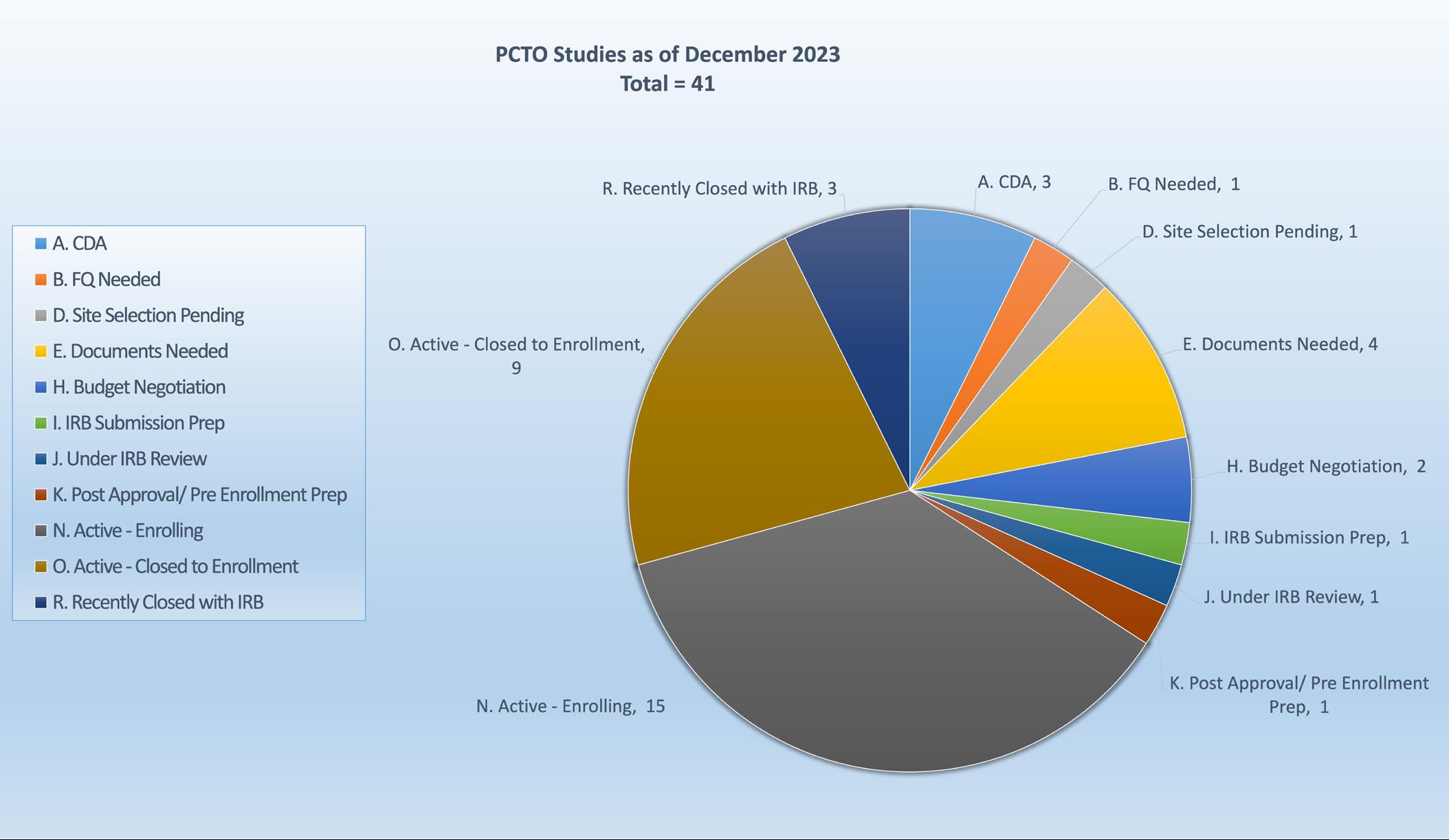
Active Clinical Trials (24)
Pediatric Divisions
Cardiology – 1 (NIH sub-award) Allergy – 7 (up from 5)
Gastroenterology – 5
Rheumatology – 1
Endocrinology – 4 PICU – 2
Nephrology – 2
NICU – 1
Collaborations with Adult Divisions:
Pediatric Allergy and Adult Dermatology – 1
The Mindich Child Health and Development Institute 50
Clinical Trials in Startup Phase (15)
Pediatrics
Allergy – 4
Rheumatology – 2
Gastroenterology – 4 NICU – 1
Endocrinology – 2 Nephrology – 1
Cardiology – 1
NOTABLE PROJECTS
• PCTO is involved in establishing Mount Sinai as a participating site in the NIH/NHLBI-funded Pediatric Heart Network, which looks at how the heart develops and why children are born with heart problems.
• PCTO activated the first trial in the PICU treating complicated bodily infections with a new therapy versus the best available therapy. This trial has the potential to make a meaningful impact on the lives of children and families facing serious infections.
• PCTO with the Allergy Division contributed to Mount Sinai being recognized as 1 of the top 4 (out of 86 international sites) recruiting for a trial evaluating an investigational drug patch for 4- to 7-year-old children with peanut allergy where the patch is designed to simulate repeated exposures to the allergen.
The Mindich Child Health and Development Institute 51
PEDIATRIC PRECISION MEDICINE
Precision medicine (PM) uses individualized patient data to accurately diagnose disease, better predict the outcomes of medical issues, and treat illnesses more effectively. Currently, medical problems with strong genetic underpinnings such as congenital anomalies, neurodevelopmental disorders, and inborn errors of immunity are ones that typically manifest during infancy, childhood, and/or adolescence, and where a PM approach can be most impactful. Moreover, these types of conditions can lead to diagnostic odysseys, during which young patients are subjected to extensive medical testing for months or years, families wait anxiously for definitive answers, and effective therapies, when available, are delayed.
The MCHDI is focusing on pediatric PM as one of its main strategic initiatives. The Undiagnosed Diseases Program (UDP) was established in 2017 and throughout the years has contributed to important advances in science and medicine with the discovery of novel disease genes. Additionally, the UDP has also improved patient care by identifying a unifying genetic cause for the constellation of medical problems that patients present—which gives patients and their families a much-needed sense of closure and opens a new chapter where they can navigate medical care with a personalized compass.
This cutting-edge program, now led by Mafalda Barbosa, MD, PhD, is so successful because it benefits from a multidisciplinary team that includes both clinicians (including pediatricians, subspecialists, and clinical geneticists) and researchers (including PhD investigators, bioinformaticians, and laboratory geneticists). They continue to enroll infants, children, and adolescents with unsolved diseases that seem likely to have a genetic underpinning and then use new generation DNA sequencing technologies to identify the causal genetic variation. In order to improve their diagnostic yield and boost discovery, future directions of their program include moving towards third-generation sequencing and strengthening their relationship with the Functional Genomics and Disease Modeling Core.
The Functional Genomics and Disease Modeling Core is led by Tirtha K. Das, PhD, and was established a few years ago to leverage the strengths of the Drosophila genetic system and to develop whole animal fly models of rare gene variants in pediatric and other rare disease indications. The core uses multiple established transgenic approaches as well as newly developed assays to provide insights about how these gene variants function in vivo. The objective is to serve as important leads for ongoing and future studies in vertebrate models, to be ultimately translated to the clinics. The focus has currently been to develop models related to rare variants of: a) RASopathies, b) undiagnosed diseases, c) cancer. The core has developed 20 new RASopathy fly models for various genes in the MAPK pathway. Analysis of how these variants affect lacZ reporters for the major signaling pathways have been completed, revealing some key differences that can be leads for further analysis in relevant vertebrate models.
An important focus of the core is analyzing gene variants identified in the UDP and rarely associated in other diseases. Dr. Das and his team developed fly models of NDUFAF and MAGI2, and analysis of how these variants affect lacZ reporters for the major signaling pathways have been nearly completed.
In addition, they have also developed five models of rare kinase-fusion gene variants that arise in patients undergoing targeted lung cancer therapy. Using a combination of lacZ reporter and western blot analysis key signaling differences have been identified and two manuscripts are being finalized for submission.
Finally, this year they have further used their fly expertise and initiated multiple investigator-initiated screens of drugs and novel compounds in our fly disease models. These screens serve as good first-step therapeutic index indicators, as well as to comprehend possible mechanisms of action, and helps identify lead compounds to further test in vertebrate models.
They also want to improve participation of children in genomic research. A common barrier to participation is the difficulty with obtaining a sample. However, cord blood collection is noninvasive and is routinely collected for medical care. In order to use cord blood in future genomic studies, they had to prove that this is an appropriate specimen. There are concerns that cord blood may not be a good source of DNA for genetic studies because of possible presence of cells from the mother in the cord blood. They hoped that validating cord blood as a suitable specimen for genomic studies would allow for streamlined participation of babies in large-scale genomic studies in the future. As such, last year a pilot study was developed that aimed at assessing if cord blood was a suitable specimen for genomic analysis. Thirty specimens of cord blood were tested and verified that there was no maternal contamination, validating their hypothesis. A manuscript is under preparation.
Another important initiative of the pediatric PM pertains to the recruitment of a pediatric cohort in the realm of the Mount Sinai Million Health Discoveries Program. They are collaborating with the Charles Bronfman Institute for Personalized Medicine in the effort of creating a new repository of sequencing data that will integrate health and research data at Mount Sinai. The overarching goal is to biobank genetic information from 1 million individuals who are representative of the diversity of our global population. The efforts of Dr. Gelb and Dr. Barbosa are focused on the enrollment of 100K individuals in the pediatric age range. This will constitute one of the largest and most diverse pediatric biobanks ever established and will be leveraged to allow for better understanding of the impact of genetic variations on human health and disease across the lifespan with the end goal of development of novel treatments and disease prevention. They are excited to announce that this groundbreaking initiative will start enrolling participants in 2024!
The Mindich Child Health and Development Institute 52
CENTER FOR CHILD HEALTH SERVICES RESEARCH
The Center for Child Health Services Research in the Mindich Child Health and Development Institute at the Icahn School of Medicine at Mount Sinai serves as the primary locus for research. The Center is directed by Brett R. Anderson, MD, MBA, MS and is actively engaged in developing a robust data infrastructure to gather information securely and efficiently, all in an effort to improve child health care. It seeks to promote the sharing of interdisciplinary ideas, methodologies, data, and mentorship, to enhance productivity and creativity for investigators—both within and outside the Center. To support its initiatives, it will be partnering with existing departments, institutes, and governmental agencies. The Center’s expertise focuses on improving the quality and effectiveness of the health care system for all children, with particular emphasis on providers, payers, and policy; value and effectiveness; and access and equity.
Faculty and Staff:
Brett R. Anderson, MD, MBA, MS Director
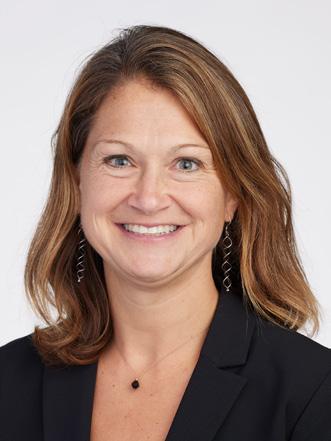
Dr. Brett R. Anderson is the inaugural Director for the Center for Child Health Services Research in the Mindich Child Health and Development Institute. Dr. Anderson is an Associate Professor in the Departments of Pediatrics and Population Health and Policy, and an NHLBI R01-funded health services and
health equity researcher. In her leadership role, she is fostering interdisciplinary collaborations to establish a primary locus for research on the quality and effectiveness of the health care system for children at the Icahn School of Medicine. Dr. Anderson’s research focuses on linkage and integration of large datasets and application of econometric modeling to identify modifiable drivers of outcomes, value, and health inequities for children with cardiac disease.
Sarah Crook, PhD Director of Analytics
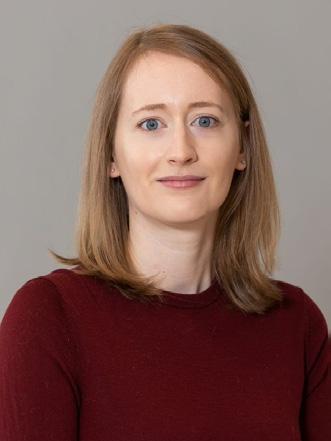
Dr. Crook is an Assistant Professor in the Department of Population Health. She serves as the Director of Analytics for the Center for Child Health Services Research, with expertise in biostatistics, epidemiology, and health services research. Dr. Crook earned both her BS in human physiology and MS in epidemiology and biostatistics
from the University of Leeds, UK. She then completed her PhD in epidemiology and biostatistics at the University of Zurich, Switzerland, and a training fellowship in Guidelines Methodology with Cochrane and the UK’s National Institute of Health and Care Excellence.
Dr. Crook will contribute to the Center’s initiative through the application of her expertise and specialization in large-scale data analytics. This includes the integration of clinical registry data, administrative data, and social determinants of health.
The Mindich Child Health and Development Institute 53
CENTER FOR CHILD HEALTH SERVICES RESEARCH

Mr. Jiang serves as the Senior Data Analyst for the Center for Child Health Services Research. He plays a pivotal role in fostering a dynamic and efficient data environment for the Center. Mr. Jiang is a DrPH student at Johns Hopkins Bloomberg
School of Public Health, and holds an undergraduate degree in mathematics and economics from UCLA and a master’s in biostatistics from the Mailman School of Public Health at Columbia University.
Mr. Jiang is responsible for designing and managing the data infrastructure, as well as providing essential analytic support to the faculty and collaborators.
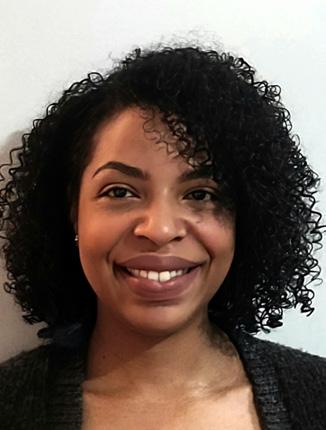
Yohaira Rojas Guzman joins as the Administrative Director of the Center for Child Health Services Research. In her previous role, Ms. Guzman directed a mobile prostate cancer screening program, extending vital screenings and outreach to underserved communities. Her career at Mount Sinai began in 2015 as Administrative Manager of Operations at the Center for Advanced Medicine, where she supported patient care access and navigation. Ms. Guzman’s background encompasses
roles such as the Associate Director of Ambulatory Care Operations at Mount Sinai Hospital, where she directed construction projects and managed ambulatory practices. Additionally, she served as the Emergency Management Branch Director, overseeing planning, response, and recovery services. Before joining Mount Sinai, she worked as the Manager of Clinical Operations & Training at Rutgers University School of Dental Medicine and held several roles in revenue cycle operations at Columbia University School of Dental Medicine. As Administrative Director, she will play a pivotal role in supporting the Center’s operations and cross-functional collaboration.
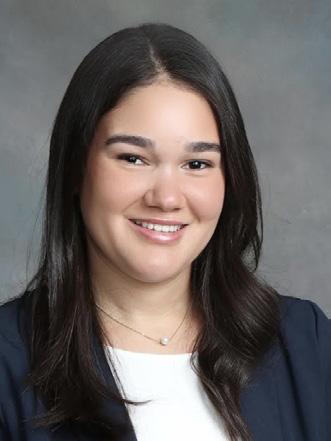
Chantal Sanchez is the Research Manager for the Center for Child Health Services Research. Ms. Sanchez completed her undergraduate degree in biology at Columbia University and worked as a Clinical Research Coordinator before
joining the team. Ms. Sanchez will focus primarily on supporting the Center’s initiatives and contribute to its studies on outcomes and health disparities for children and young adults with congenital heart disease.
The Mindich Child Health and Development Institute 54
Pengfei Jiang, MS Senior Data Analyst
Yohaira Rojas Guzman Administrative Director
Chantal Sanchez Research Manager
LEADERSHIP AND STAFF
FACULTY
Brett R. Anderson, MD, MBA, MS
Mafalda Barbosa, MD, PhD
Sharon Baumel-Alterzon, PhD
M. Cecilia Berin, PhD
Harold S. Bernstein, MD, PhD
Romina Bevacqua, PhD
James J. Bieker, PhD
Dusan Bogunovic, PhD
Jennifer Bragg, MD
Michael S. Breen, PhD
Brian D. Brown, PhD
John Bucuvalas, MD
Supinda Bunyavanich, MD, MPH, MPhil
Joseph D. Buxbaum, PhD
Minji Byun, PhD
Ross L. Cagan, PhD
Nathalie Chami, PhD
Jia Chen, ScD
Jaime Chu, MD
Charlotte Cunningham-Rundles, MD, PhD
Tirtha K. Das, PhD
Nicole C. Dubois, PhD
Silvia De Rubeis, PhD
Sarah Duncan-Park, PhD
David Dunkin, MD
Son Duong, MD
Lisa Eiland, MD
Fernando Ferrer, MD, FACS, FAAP
Jennifer Foss-Feig, PhD
Sandeep Gangadharan, MD
Yolanda Garcia-Carmona, PhD
Adolfo García-Ocaña, PhD
Bruce D. Gelb, MD
Chris Gennings, PhD
Dorothy E. Grice, MD
Alan Groves, MBChB, MD
Katherine Guttmann, MD, MBE
Joan Han, MD
Ke Hao, ScD
Geming Lu, MD
Hala Harony-Nicolas, PhD
Megan K. Horton, PhD, MPH
Dirk Hubmacher, PhD
Yuval Itan, PhD
Magdalena U. Janecka, PhD
Megan Januska, MD
Allan C. Just, PhD
Liora S. Katz, PhD
Esra Karakose, PhD
Alex Kolevzon, MD
Bruce D. Gelb, MD Director
Elena Lum, PhD Administrative Director
Shavez Jackson Administrative Manager
Amy R. Kontorovich, MD, PhD
Robert S. Krauss, PhD
Maria Curotto de Lafaille, PhD
Luca Lambertini, PhD
Corina Lesseur, MD, PhD
Shelley H. Liu, PhD
Ruth J.F. Loos, PhD
Behrang Mahjani, PhD
Florence Marlow, PhD
Alejandro Martin-Trujillo, PhD
Marek Mlodzik, PhD
Anne Moon, MD, PhD
Hirofumi Morishita, MD, PhD
Kaustav Mukherjee, PhD
Georgia Panagiotakos, PhD
Dalila Pinto, PhD
Praveen Raju, MD, PhD
Nicole Ramsey, MD, PhD
Avi Reichenberg, PhD
Michael Rendl, MD
Anna Rommel, PhD
Jeffrey M. Saland, MD
Hugh A. Sampson, MD
Lisa M. Satlin, MD
Donald K. Scott, PhD
Andrew J. Sharp, PhD
Eyal Shemesh, MD
Scott H. Sicherer, MD
Paige M. Siper, PhD
Sarah Stanley, PhD
Andrew F. Stewart, MD
Christopher Sturgeon, PhD
Annemarie Stroustrup, MD, MPH
Shanna H. Swan, PhD
Susan Teitelbaum, PhD
Caterina Tiozzo, MD, PhD
Ernest Turro, PhD
Rebecca Trachtman, MD
Pilar Trelles, MD
Nita Vangeepuram, MD, MPH
Elvin Wagenblast, PhD
Ryan W. Walker, PhD
Martin J. Walsh, PhD
Julie Wang, MD
Bryn D. Webb, MD
Karen M. Wilson, MD, MPH
Anusha Yeshokumar, MD
Alisha Graham Administrative Coordinator
Jennifer E. Cole
Senior Director of Development
INTERNAL ADVISORY BOARD
Supinda Bunyavanich, MD, MPH, MPhil
Joseph D. Buxbaum, PhD
Nicole C. Dubois, PhD
Andrew J. Sharp, PhD
EXTERNAL ADVISORY BOARD
Scott Baldwin, MD (Vanderbilt University)
Marie Lynn Miranda, PhD (University of Michigan)
Joseph Piven, MD (University of North Carolina at Chapel Hill)
LEADERSHIP COUNCIL
Eric and Stacey Mindich
Kimara Ahnert
Vivek and Sarika Bantwal
Ethan Binder and Gaynor Cunningham
David and Lorie Broser
Joshua and Rachel Crane
Katie Danziger
Donald Gogel and Georgia G. Wall
Bruce and Cara Haggerty
Michael and Andre Koester
Andrew R. and Karen B. Levinson
Jeffrey Lin and Jillian Salyer
Jamie and Stephanie McNab
Glenn and Stacy Nordlinger
Ari Zweiman
For more information on the MCHDI, please visit our website at www.mssm.edu/mchdi
The Mindich Child Health and Development Institute 55
The Mindich Child Health and Development Institute 56



 Bruce D. Gelb, MD, Director
Bruce D. Gelb, MD, Director






































































































































































